Maggie James's Blog, page 18
April 30, 2015
Five great opening lines from novels
By Maggie James
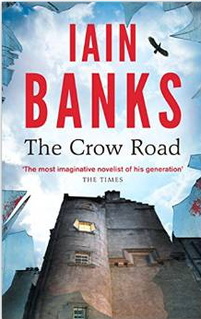 Novelists are often advised to write a killer first line, a hook so powerful it'll drag the reader by the throat into the rest of the book. It's the old adage of making a good first impression, this time in literary form. Here's Stephen King's opinion on the subject:
Novelists are often advised to write a killer first line, a hook so powerful it'll drag the reader by the throat into the rest of the book. It's the old adage of making a good first impression, this time in literary form. Here's Stephen King's opinion on the subject:
'An opening line should invite the reader to begin the story. It should say: Listen. Come in here. You want to know about this.'
Hard to argue with that! As part of the 'Five' series, in this week's post I'm examining five great opening sentences from novels.
1. The Crow Road - Iain Banks (1992)
'It was the day my grandmother exploded.'
Wow, what a kicker first line! Followed by: 'I sat in the crematorium, listening to my Uncle Hamish quietly snoring in harmony to Bach's Mass in B Minor, and I reflected that it always seemed to be death that drew me back to Gallanach.' Not bad for a second line, either!
The rest of the book doesn't disappoint. I have a love/hate relationship with Iain Banks's novels, having loathed 'The Wasp Factory', been ambivalent about 'Stonemouth', and awed by 'The Crow Road'. The latter is the story of Prentice McHoan, who seeks answers about the disappearance of his uncle eight years ago. The Crow Road is the name of the book Prentice's uncle, Rory, was writing when he vanished, and is also a metaphor for death. Along the way Prentice questions the existence of God and the afterlife, fuelled by sex, drink,and illegal substances. It's a great read!
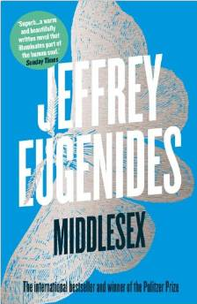 2
. Middlesex - Jeffrey Eugenides (2002)
2
. Middlesex - Jeffrey Eugenides (2002)
'I was born twice: first, as a baby girl, on a remarkably smogless Detroit day in January of 1960; and then again, as a teenage boy, in an emergency room near Petoskey, Michigan, in August of 1974.'
Well, that's intriguing! Right from the start, we're made aware that 'Middlesex' is a story of intergender life, if the title didn't make it obvious. But why did the protagonist's second birth take place in an emergency room? Jeffrey Eugenides's clever opening salvo makes me keen to discover more....
'Middlesex' is the story of Calliope Stephanides and her strange family secret. Calliope later becomes Cal, the narrator of the novel. He/she is an intersex individual raised as a girl, but who, hormonally speaking, is male. Growing up in 1970s Michigan, Cal/Calliope's story is set against a background detailing the experiences of Greek immigrants in the United States, and the fortunes of Detroit.
'Middlesex' won the 2003 Pulitzer Prize for Fiction. The book was also shortlisted for the National Book Critics Circle Award and the International Dublin Literary Award.
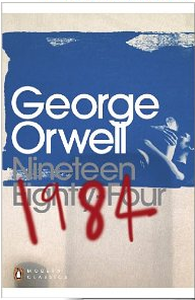 3. Nineteen Eighty-Four - George Orwell (1949)
3. Nineteen Eighty-Four - George Orwell (1949)
'It was a bright cold day in April, and the clocks were striking thirteen.'
Regular readers of my blog will already know the high regard in which I hold this novel, ever since its story of dystopian tyranny stunned me as a teenager. And what a great opening line! Who wouldn't read that last word and think 'huh?'
From the start, Orwell makes us aware we're entering a strange and disturbing world, one that's familiar and at the same time different. A world in which the calendar months haven't changed, but the way we tell time has. We're all familiar with the twenty-four hour clock, yet the way Orwell uses it grabs our attention. By a simple word trick, he sets the scene for life on Airstrip One, formerly Great Britain. A world in which, to quote from the book, 'who controls the past controls the future: who controls the present controls the past'. Enter Winston Smith, whose job it is to rewrite the past, despite inwardly rebelling against life in totalitarian Britain.
'1984' is a grim read in places, especially the interrogation scenes, but it's deservedly a classic.
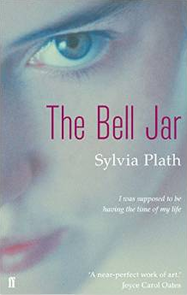 4. The Bell Jar - Sylvia Plath (1963)
4. The Bell Jar - Sylvia Plath (1963)
'It was a queer, sultry summer, the summer they electrocuted the Rosenbergs, and I didn't know what I was doing in New York.'
In one sentence, Plath sets the scene: it's summer, it's 1953, our protagonist is in New York, and we already know she's confused.
'The Bell Jar' is not an easy read, being partly based on Plath's own experiences with mental illness. It's the story of Esther Greenwood, a young woman who wins an internship on a New York fashion magazine. At first, she's delighted, believing she'll finally achieve her dream of becoming a writer. The fast pace of New York only serves to frighten her, though, and she has no idea what to do with her life. The only alternatives appear to be motherhood or a job as a stenographer, neither of which appeal. Gradually, Esther's life slides out of control. She spirals into depression, the bell jar of the book's title being a metaphor for her mental prison.
'The Bell Jar', Sylvia Plath's only novel, was originally published in 1963 under the pseudonym Victoria Lucas. Plath committed suicide shortly after the book's UK publication.
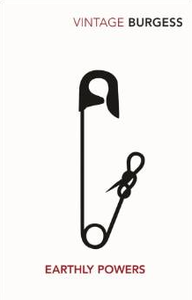 5. Earthly Powers - Anthony Burgess (1980)
5. Earthly Powers - Anthony Burgess (1980)
'It was the afternoon of my eighty-first birthday, and I was in bed with my catamite when Ali announced that the archbishop had come to see me.'
So much information wrapped up in one sentence! What strikes me the most is the word 'catamite', a word we seldom hear nowadays, meaning it's immediately attention grabbing. Then there's the fact our protagonist tells us he's eighty-one. Ageism is alive and well in our society; many people write off the elderly as being past sex, but this one clearly isn't. Throw religion into the mix in the shape of the visiting archbishop, and Burgess gives us a masterly opening to his novel.
'Earthly Powers' tells the story of Kenneth Toomey, a novelist who embarks on writing his memoirs. Toomey is also asked by the Archbishop of Malta to help with the canonisation of Carlo Campanati. Campanati uses his guile to rise through the ranks of the Catholic Church; Burgess uses him to illustrate the lust for power and what men will do to attain it. Power, sex and religion - the stage is set for a great read!
Let's hear from you!
Do you have any favourite opening lines from novels? What about closing ones? I'll write a post in the near future about great closing lines, so if you have any you'd like me to consider, leave a comment and let me know.
Enjoyed this post? Please share via the links below:
Why not subscribe to my blog and newsletter?
 If you've enjoyed this blog post, how about subscribing via RSS feed or email? Either click the links in my blog sidebar or sign up via Networked Blogs, also in the sidebar. It'll be great to have you on board!
If you've enjoyed this blog post, how about subscribing via RSS feed or email? Either click the links in my blog sidebar or sign up via Networked Blogs, also in the sidebar. It'll be great to have you on board!
Want early bird discounts on my future releases, as well as information about special promotions and giveaways? Simply enter your details in the form here, or at the top of the sidebar. I respect your privacy and will never sell your details to any third parties.
 Novelists are often advised to write a killer first line, a hook so powerful it'll drag the reader by the throat into the rest of the book. It's the old adage of making a good first impression, this time in literary form. Here's Stephen King's opinion on the subject:
Novelists are often advised to write a killer first line, a hook so powerful it'll drag the reader by the throat into the rest of the book. It's the old adage of making a good first impression, this time in literary form. Here's Stephen King's opinion on the subject:'An opening line should invite the reader to begin the story. It should say: Listen. Come in here. You want to know about this.'
Hard to argue with that! As part of the 'Five' series, in this week's post I'm examining five great opening sentences from novels.
1. The Crow Road - Iain Banks (1992)
'It was the day my grandmother exploded.'
Wow, what a kicker first line! Followed by: 'I sat in the crematorium, listening to my Uncle Hamish quietly snoring in harmony to Bach's Mass in B Minor, and I reflected that it always seemed to be death that drew me back to Gallanach.' Not bad for a second line, either!
The rest of the book doesn't disappoint. I have a love/hate relationship with Iain Banks's novels, having loathed 'The Wasp Factory', been ambivalent about 'Stonemouth', and awed by 'The Crow Road'. The latter is the story of Prentice McHoan, who seeks answers about the disappearance of his uncle eight years ago. The Crow Road is the name of the book Prentice's uncle, Rory, was writing when he vanished, and is also a metaphor for death. Along the way Prentice questions the existence of God and the afterlife, fuelled by sex, drink,and illegal substances. It's a great read!
 2
. Middlesex - Jeffrey Eugenides (2002)
2
. Middlesex - Jeffrey Eugenides (2002)'I was born twice: first, as a baby girl, on a remarkably smogless Detroit day in January of 1960; and then again, as a teenage boy, in an emergency room near Petoskey, Michigan, in August of 1974.'
Well, that's intriguing! Right from the start, we're made aware that 'Middlesex' is a story of intergender life, if the title didn't make it obvious. But why did the protagonist's second birth take place in an emergency room? Jeffrey Eugenides's clever opening salvo makes me keen to discover more....
'Middlesex' is the story of Calliope Stephanides and her strange family secret. Calliope later becomes Cal, the narrator of the novel. He/she is an intersex individual raised as a girl, but who, hormonally speaking, is male. Growing up in 1970s Michigan, Cal/Calliope's story is set against a background detailing the experiences of Greek immigrants in the United States, and the fortunes of Detroit.
'Middlesex' won the 2003 Pulitzer Prize for Fiction. The book was also shortlisted for the National Book Critics Circle Award and the International Dublin Literary Award.
 3. Nineteen Eighty-Four - George Orwell (1949)
3. Nineteen Eighty-Four - George Orwell (1949)'It was a bright cold day in April, and the clocks were striking thirteen.'
Regular readers of my blog will already know the high regard in which I hold this novel, ever since its story of dystopian tyranny stunned me as a teenager. And what a great opening line! Who wouldn't read that last word and think 'huh?'
From the start, Orwell makes us aware we're entering a strange and disturbing world, one that's familiar and at the same time different. A world in which the calendar months haven't changed, but the way we tell time has. We're all familiar with the twenty-four hour clock, yet the way Orwell uses it grabs our attention. By a simple word trick, he sets the scene for life on Airstrip One, formerly Great Britain. A world in which, to quote from the book, 'who controls the past controls the future: who controls the present controls the past'. Enter Winston Smith, whose job it is to rewrite the past, despite inwardly rebelling against life in totalitarian Britain.
'1984' is a grim read in places, especially the interrogation scenes, but it's deservedly a classic.
 4. The Bell Jar - Sylvia Plath (1963)
4. The Bell Jar - Sylvia Plath (1963)'It was a queer, sultry summer, the summer they electrocuted the Rosenbergs, and I didn't know what I was doing in New York.'
In one sentence, Plath sets the scene: it's summer, it's 1953, our protagonist is in New York, and we already know she's confused.
'The Bell Jar' is not an easy read, being partly based on Plath's own experiences with mental illness. It's the story of Esther Greenwood, a young woman who wins an internship on a New York fashion magazine. At first, she's delighted, believing she'll finally achieve her dream of becoming a writer. The fast pace of New York only serves to frighten her, though, and she has no idea what to do with her life. The only alternatives appear to be motherhood or a job as a stenographer, neither of which appeal. Gradually, Esther's life slides out of control. She spirals into depression, the bell jar of the book's title being a metaphor for her mental prison.
'The Bell Jar', Sylvia Plath's only novel, was originally published in 1963 under the pseudonym Victoria Lucas. Plath committed suicide shortly after the book's UK publication.
 5. Earthly Powers - Anthony Burgess (1980)
5. Earthly Powers - Anthony Burgess (1980)'It was the afternoon of my eighty-first birthday, and I was in bed with my catamite when Ali announced that the archbishop had come to see me.'
So much information wrapped up in one sentence! What strikes me the most is the word 'catamite', a word we seldom hear nowadays, meaning it's immediately attention grabbing. Then there's the fact our protagonist tells us he's eighty-one. Ageism is alive and well in our society; many people write off the elderly as being past sex, but this one clearly isn't. Throw religion into the mix in the shape of the visiting archbishop, and Burgess gives us a masterly opening to his novel.
'Earthly Powers' tells the story of Kenneth Toomey, a novelist who embarks on writing his memoirs. Toomey is also asked by the Archbishop of Malta to help with the canonisation of Carlo Campanati. Campanati uses his guile to rise through the ranks of the Catholic Church; Burgess uses him to illustrate the lust for power and what men will do to attain it. Power, sex and religion - the stage is set for a great read!
Let's hear from you!
Do you have any favourite opening lines from novels? What about closing ones? I'll write a post in the near future about great closing lines, so if you have any you'd like me to consider, leave a comment and let me know.
Enjoyed this post? Please share via the links below:
Why not subscribe to my blog and newsletter?
 If you've enjoyed this blog post, how about subscribing via RSS feed or email? Either click the links in my blog sidebar or sign up via Networked Blogs, also in the sidebar. It'll be great to have you on board!
If you've enjoyed this blog post, how about subscribing via RSS feed or email? Either click the links in my blog sidebar or sign up via Networked Blogs, also in the sidebar. It'll be great to have you on board!Want early bird discounts on my future releases, as well as information about special promotions and giveaways? Simply enter your details in the form here, or at the top of the sidebar. I respect your privacy and will never sell your details to any third parties.
Published on April 30, 2015 03:19
April 22, 2015
Bad, mad, and dangerous to read: the thorny topic of book censorship
By Maggie James
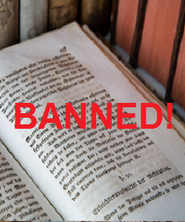 Recently, I published a post about how one of my author friends had his book rejected for sale here in the UK. Today I’d like to explore the wider issue of book censorship.
Recently, I published a post about how one of my author friends had his book rejected for sale here in the UK. Today I’d like to explore the wider issue of book censorship.
So why ban books? A number of justifications can be put forward. Moral reasons are often cited, with books being prohibited for content relating to sexual matters or for promoting social degeneracy. Political motives are also often a factor; repressive governments ban books they view as threatening or subversive.
Religion is another leading cause. Spiritual leaders seek to shield the faithful from ideas that run counter to the tenets of that religion. This includes scriptures from other faiths; the Bible, along with other religious works, is prohibited in several countries, including North Korea.
You might think that book banning is restricted to repressive governments or religious extremism. But no. Books are still banned today throughout the world, and for a wide variety of reasons, although the level of censorship varies from one country to another.
Let's look at a selection of books that have faced censorship.
The naughty parade - why these books have aroused disapproval
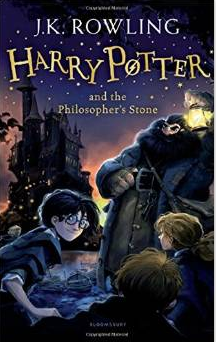
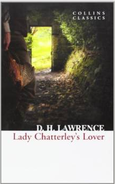
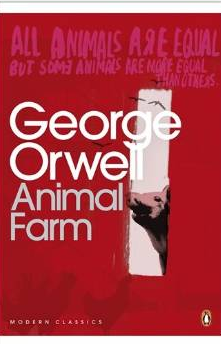
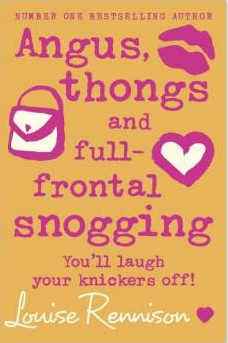
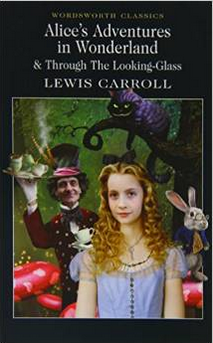 1. Harry Potter and the Philosopher's Stone - J K Rowling, 1997 – banned on religious grounds
1. Harry Potter and the Philosopher's Stone - J K Rowling, 1997 – banned on religious grounds
Can you believe it? Surely it’s just a charming novel that appeals to both children and adults, in which Harry Potter discovers he's a wizard? Nope, to some it’s more insidious. Many US states banned and burned it for promoting witchcraft, and the book has been prohibited in some Christian schools in the UK.
2. Lady Chatterley's Lover - D. H. Lawrence, 1928 – banned for sexual content
The most famous of Lawrence's novels, Lady Chatterley's Lover shocked Britain in 1928 with its story of an affair between a sexually repressed upper-class woman and her husband’s gamekeeper. The book includes descriptions of anal sex and female orgasm, deemed too offensive to read at the time. The full unexpurgated version was not published in the UK until 1960, testing the new obscenity laws created by the Obscene Publications Act of 1959.
3. Animal Farm – George Orwell , 1945– banned on political grounds
This book is particularly appropriate to include because Orwell’s novel demonstrates the importance of democracy and freedom of speech. At first blush, it appears to be a fable about life on a farm, with talking pigs and dogs. The farmyard is, however, a metaphor for a deeper message about totalitarianism and corruption. In the 1940s, Allied forces found the book critical of the USSR, one of the UK’s allies in World War Two, and therefore too controversial to print.
4. Angus, Thongs and Full Frontal Snogging - Louise Rennison, 1999 – banned as unsuitable for minors
I had to include this book on the grounds of its title alone!
The first in the Confessions of Georgia Nicolson series, the novel's frank discussion of boys, along with references to lesbianism, pornography, and erect penises have made it a target for censorship in US schools.
5. Alice’s Adventures in Wonderland – Lewis Carroll – banned (in my view) on grounds that are simply daft!
This children’s book was banned in Hunan, China, because it depicted animals acting with the same complexity as humans. The rationale was that attributing human language to animals was an insult to humans, leading children to regard people and animals on the same level. In the censor’s view, that would be disastrous.
The lure of the forbidden...
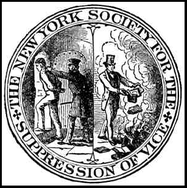 Didn't our Chinese friend have better matters with which to concern himself? Wouldn't some of the uptight individuals who banned the books I've mentioned have done better to chill out and go have fun?
Didn't our Chinese friend have better matters with which to concern himself? Wouldn't some of the uptight individuals who banned the books I've mentioned have done better to chill out and go have fun?
The thing is, they're a reflection of the cultural norms in which they found themselves. Views of what’s acceptable change according to the spirit of the times. Nowadays, the sexual content of Lady Chatterley’s Lover seems tame. Harry Potter as propaganda promoting witchcraft? Bizarre - unless you’re a religious fundamentalist from the US’s Bible Belt.
Isn’t it ironic that banning books often leads people to desire to read them? We never quite lose the childhood lure of the forbidden. There are websites devoted to banned books, and Banned Books Week is an annual event that celebrates the freedom to read, held during the last week in September.Where do we draw the line?
 As somebody who loves books, I find the idea of banning them abhorrent. Even worse is the practice of biblioclasm, the public and ceremonial destruction of written material. In many cases, the works destroyed are irreplaceable, representing a tragic loss of cultural heritage. Examples include the burning of books under China's Qin Dynasty and the Nazi book burnings.
As somebody who loves books, I find the idea of banning them abhorrent. Even worse is the practice of biblioclasm, the public and ceremonial destruction of written material. In many cases, the works destroyed are irreplaceable, representing a tragic loss of cultural heritage. Examples include the burning of books under China's Qin Dynasty and the Nazi book burnings.
I believe some restrictions are appropriate. I’m against children having access to pornography, for example. Material promoting terrorism might also be justifiably banned. Other than that, I don’t see why adults can’t read whatever they choose, however offensive someone else may deem it. Why should the values of others dictate my reading choices?
We tread a dangerous path when we issue decrees about what’s suitable to read and what’s not. How far do we take censorship? Am I right in believing pornography shouldn’t be available to children? If my views are accommodated, shouldn't the concerns of the anti-Harry Potter brigade be given equal weight? Where do we draw the line? I don't pretend to know the answer, but I suspect it's best to err on the side of freedom rather than suppression.
Let's hear from you!
Do banned books entice and intrigue you with their aura of wickedness? Do you uphold the banning of certain books, and if so, which ones, and why? Leave a comment and let me know!
Enjoyed this post? Click the links below to share.
Why not subscribe to my blog?
 If you've enjoyed this blog post, how about subscribing via RSS feed or email? Either click the links in my blog sidebar or sign up via Networked Blogs, also in the sidebar. It'll be great to have you on board!
If you've enjoyed this blog post, how about subscribing via RSS feed or email? Either click the links in my blog sidebar or sign up via Networked Blogs, also in the sidebar. It'll be great to have you on board!
Want early bird discounts on my future releases, as well as information about special promotions and giveaways? Simply enter your details in the form here, or at the top of the sidebar. I respect your privacy and will never sell your details to any third parties.
 Recently, I published a post about how one of my author friends had his book rejected for sale here in the UK. Today I’d like to explore the wider issue of book censorship.
Recently, I published a post about how one of my author friends had his book rejected for sale here in the UK. Today I’d like to explore the wider issue of book censorship.So why ban books? A number of justifications can be put forward. Moral reasons are often cited, with books being prohibited for content relating to sexual matters or for promoting social degeneracy. Political motives are also often a factor; repressive governments ban books they view as threatening or subversive.
Religion is another leading cause. Spiritual leaders seek to shield the faithful from ideas that run counter to the tenets of that religion. This includes scriptures from other faiths; the Bible, along with other religious works, is prohibited in several countries, including North Korea.
You might think that book banning is restricted to repressive governments or religious extremism. But no. Books are still banned today throughout the world, and for a wide variety of reasons, although the level of censorship varies from one country to another.
Let's look at a selection of books that have faced censorship.
The naughty parade - why these books have aroused disapproval




 1. Harry Potter and the Philosopher's Stone - J K Rowling, 1997 – banned on religious grounds
1. Harry Potter and the Philosopher's Stone - J K Rowling, 1997 – banned on religious groundsCan you believe it? Surely it’s just a charming novel that appeals to both children and adults, in which Harry Potter discovers he's a wizard? Nope, to some it’s more insidious. Many US states banned and burned it for promoting witchcraft, and the book has been prohibited in some Christian schools in the UK.
2. Lady Chatterley's Lover - D. H. Lawrence, 1928 – banned for sexual content
The most famous of Lawrence's novels, Lady Chatterley's Lover shocked Britain in 1928 with its story of an affair between a sexually repressed upper-class woman and her husband’s gamekeeper. The book includes descriptions of anal sex and female orgasm, deemed too offensive to read at the time. The full unexpurgated version was not published in the UK until 1960, testing the new obscenity laws created by the Obscene Publications Act of 1959.
3. Animal Farm – George Orwell , 1945– banned on political grounds
This book is particularly appropriate to include because Orwell’s novel demonstrates the importance of democracy and freedom of speech. At first blush, it appears to be a fable about life on a farm, with talking pigs and dogs. The farmyard is, however, a metaphor for a deeper message about totalitarianism and corruption. In the 1940s, Allied forces found the book critical of the USSR, one of the UK’s allies in World War Two, and therefore too controversial to print.
4. Angus, Thongs and Full Frontal Snogging - Louise Rennison, 1999 – banned as unsuitable for minors
I had to include this book on the grounds of its title alone!
The first in the Confessions of Georgia Nicolson series, the novel's frank discussion of boys, along with references to lesbianism, pornography, and erect penises have made it a target for censorship in US schools.
5. Alice’s Adventures in Wonderland – Lewis Carroll – banned (in my view) on grounds that are simply daft!
This children’s book was banned in Hunan, China, because it depicted animals acting with the same complexity as humans. The rationale was that attributing human language to animals was an insult to humans, leading children to regard people and animals on the same level. In the censor’s view, that would be disastrous.
The lure of the forbidden...
 Didn't our Chinese friend have better matters with which to concern himself? Wouldn't some of the uptight individuals who banned the books I've mentioned have done better to chill out and go have fun?
Didn't our Chinese friend have better matters with which to concern himself? Wouldn't some of the uptight individuals who banned the books I've mentioned have done better to chill out and go have fun?The thing is, they're a reflection of the cultural norms in which they found themselves. Views of what’s acceptable change according to the spirit of the times. Nowadays, the sexual content of Lady Chatterley’s Lover seems tame. Harry Potter as propaganda promoting witchcraft? Bizarre - unless you’re a religious fundamentalist from the US’s Bible Belt.
Isn’t it ironic that banning books often leads people to desire to read them? We never quite lose the childhood lure of the forbidden. There are websites devoted to banned books, and Banned Books Week is an annual event that celebrates the freedom to read, held during the last week in September.Where do we draw the line?
 As somebody who loves books, I find the idea of banning them abhorrent. Even worse is the practice of biblioclasm, the public and ceremonial destruction of written material. In many cases, the works destroyed are irreplaceable, representing a tragic loss of cultural heritage. Examples include the burning of books under China's Qin Dynasty and the Nazi book burnings.
As somebody who loves books, I find the idea of banning them abhorrent. Even worse is the practice of biblioclasm, the public and ceremonial destruction of written material. In many cases, the works destroyed are irreplaceable, representing a tragic loss of cultural heritage. Examples include the burning of books under China's Qin Dynasty and the Nazi book burnings.I believe some restrictions are appropriate. I’m against children having access to pornography, for example. Material promoting terrorism might also be justifiably banned. Other than that, I don’t see why adults can’t read whatever they choose, however offensive someone else may deem it. Why should the values of others dictate my reading choices?
We tread a dangerous path when we issue decrees about what’s suitable to read and what’s not. How far do we take censorship? Am I right in believing pornography shouldn’t be available to children? If my views are accommodated, shouldn't the concerns of the anti-Harry Potter brigade be given equal weight? Where do we draw the line? I don't pretend to know the answer, but I suspect it's best to err on the side of freedom rather than suppression.
Let's hear from you!
Do banned books entice and intrigue you with their aura of wickedness? Do you uphold the banning of certain books, and if so, which ones, and why? Leave a comment and let me know!
Enjoyed this post? Click the links below to share.
Why not subscribe to my blog?
 If you've enjoyed this blog post, how about subscribing via RSS feed or email? Either click the links in my blog sidebar or sign up via Networked Blogs, also in the sidebar. It'll be great to have you on board!
If you've enjoyed this blog post, how about subscribing via RSS feed or email? Either click the links in my blog sidebar or sign up via Networked Blogs, also in the sidebar. It'll be great to have you on board!Want early bird discounts on my future releases, as well as information about special promotions and giveaways? Simply enter your details in the form here, or at the top of the sidebar. I respect your privacy and will never sell your details to any third parties.
Published on April 22, 2015 03:20
April 8, 2015
Do you read novels more than once?
By Maggie James
So many books, so little time!
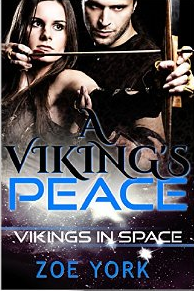 Once I used to reread favourite novels, happy to revisit those I'd enjoyed before. Sometimes I'm nostalgic for the times when I'd curl up with a treasured book to savour its magic again. Even though the story was no longer a mystery, I'd always catch nuances I'd missed before, making each reread a new take on the familiar. A long time has passed since I read the same title more than once, though. It's a trend that's set to continue.
Once I used to reread favourite novels, happy to revisit those I'd enjoyed before. Sometimes I'm nostalgic for the times when I'd curl up with a treasured book to savour its magic again. Even though the story was no longer a mystery, I'd always catch nuances I'd missed before, making each reread a new take on the familiar. A long time has passed since I read the same title more than once, though. It's a trend that's set to continue.
Why? Well, thanks to changes in the publishing industry, we're spoiled for choice when it comes to fiction. Hundreds, if not thousands, of new novels are uploaded to Amazon every day. In addition, the new wave of self-publishing is creating new genres by merging existing ones. Which makes for fascinating choices! Fancy a science fiction romance? No problem. Want to add Vikings to the mix? Your wish is granted. There are novels about dragons in space, unicorns in ancient history, you name it.
In addition, self-publishing has revitalised more than genres. Short stories and novellas are making a comeback, providing even more reading options. With such a cornucopia of material available, not to mention classic novels I've yet to read, I don't have time to pick up the same book twice. Not that I'm complaining, you understand!
I don't want old favourites to disappoint
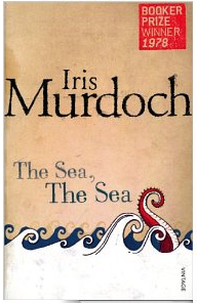 Besides the plethora of new titles available, there's another reason I don't revisit past fictional adventures. A strong possibility exists that, after a gap of several decades, they'll disappoint.
Besides the plethora of new titles available, there's another reason I don't revisit past fictional adventures. A strong possibility exists that, after a gap of several decades, they'll disappoint.
Take Iris Murdoch's 'The Sea, The Sea'. I first read this novel in my twenties, and I loved it. The character of Charles Arrowby, his selfishness, the way he blinds himself to the obvious, mesmerised me. The novel charts his reunion with his first love, Mary Hartley Fitch, whom he has not seen since his youth. Thanks to his reclusive life, he develops an obsession with her, despite the fact she now sports an old-lady moustache and doesn't return his interest. I've always been fascinated by human behaviour and foibles, and Charles's egotistic pursuit of the unfortunate Hartley, which involves her kidnap, makes wonderful reading.
Years ago, a friend and I discussed the novel, with her being as taken with 'The Sea, The Sea' as I was. Recently, however, Doran told me she'd reread the book. Had it reprised its magic for her? The answer is no.
'I've no idea why I liked it so much in the first place,' she said. Which makes me wary about rereading my old favourite. Disillusion can be a bitter pill. Isn't it better for 'The Sea, The Sea' to retain its place in my affections, rather than me risk tarnishing its memory?
Tastes and priorities change...
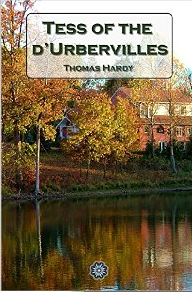 Perhaps this reflects the changes we all experience in life. Tastes and priorities alter. In my fifties, I'm very different to the woman I was in my twenties. Who wouldn't be? There's a good chance that Iris Murdoch's iconic book may not enchant me second time around.
Perhaps this reflects the changes we all experience in life. Tastes and priorities alter. In my fifties, I'm very different to the woman I was in my twenties. Who wouldn't be? There's a good chance that Iris Murdoch's iconic book may not enchant me second time around.
Take Thomas Hardy's wonderful novels, for example. As a teenager, I read every single title, relishing Hardy's biting examination of social injustices. I loathed the hypocritical Angel Clare in 'Tess of the D'Urbervilles'; Michael Henchard's character in 'The Mayor of Casterbridge' appalled me. A man who scorned his bride-to-be for not being a virgin? A rogue who sells his wife at a country fair? Shame on both of them!
I also loved Hardy's lyrical descriptions of the Dorset countryside, for which his books are justly famous. An example:
'Here in the valley, the world seems to be constructed upon a smaller and more delicate scale; the fields are mere paddocks, so reduced that from this height their hedgerows appear a network of dark green threads overspreading the paler green of the grass. The atmosphere below is languorous, and is so tinged with azure that what artists call the middle distance partakes of that hue, whilst the horizon beyond is of deepest ultramarine.' (From 'Tess of the D'Urbervilles').
Nowadays I feel little desire to read any of his books again. For one thing, as a fifty-something I'm less concerned with social commentary than I was. And whilst not denying the beauty of Hardy's prose, I'm now impatient with long-winded descriptive paragraphs. I prefer brisk action rather than eulogies about hedgerows. So I'll leave off revisiting Hardy, or any of the novelists who enchanted me as a younger woman. Time's a wastin', as they say. Instead, I'll choose something new to read.
What about you? Do you like revisiting fictional favourites? Are there books that are timeless for you, providing enjoyment every time you read them? Or do you prefer to discover fresh treasures? Leave a comment and let me know!
Click the links below to share this post via social media:
Enjoyed this post? Why not subscribe to my blog and newsletter?
 If you've enjoyed this blog post, how about subscribing via RSS feed or email? Either click the links in my blog sidebar or sign up via Networked Blogs, also in the sidebar. It'll be great to have you on board!
If you've enjoyed this blog post, how about subscribing via RSS feed or email? Either click the links in my blog sidebar or sign up via Networked Blogs, also in the sidebar. It'll be great to have you on board!
Want early bird discounts on my future releases, as well as information about special promotions and giveaways? Simply enter your details in the form here, or at the top of the sidebar. I respect your privacy and will never sell your details to any third parties.
So many books, so little time!
 Once I used to reread favourite novels, happy to revisit those I'd enjoyed before. Sometimes I'm nostalgic for the times when I'd curl up with a treasured book to savour its magic again. Even though the story was no longer a mystery, I'd always catch nuances I'd missed before, making each reread a new take on the familiar. A long time has passed since I read the same title more than once, though. It's a trend that's set to continue.
Once I used to reread favourite novels, happy to revisit those I'd enjoyed before. Sometimes I'm nostalgic for the times when I'd curl up with a treasured book to savour its magic again. Even though the story was no longer a mystery, I'd always catch nuances I'd missed before, making each reread a new take on the familiar. A long time has passed since I read the same title more than once, though. It's a trend that's set to continue.Why? Well, thanks to changes in the publishing industry, we're spoiled for choice when it comes to fiction. Hundreds, if not thousands, of new novels are uploaded to Amazon every day. In addition, the new wave of self-publishing is creating new genres by merging existing ones. Which makes for fascinating choices! Fancy a science fiction romance? No problem. Want to add Vikings to the mix? Your wish is granted. There are novels about dragons in space, unicorns in ancient history, you name it.
In addition, self-publishing has revitalised more than genres. Short stories and novellas are making a comeback, providing even more reading options. With such a cornucopia of material available, not to mention classic novels I've yet to read, I don't have time to pick up the same book twice. Not that I'm complaining, you understand!
I don't want old favourites to disappoint
 Besides the plethora of new titles available, there's another reason I don't revisit past fictional adventures. A strong possibility exists that, after a gap of several decades, they'll disappoint.
Besides the plethora of new titles available, there's another reason I don't revisit past fictional adventures. A strong possibility exists that, after a gap of several decades, they'll disappoint.Take Iris Murdoch's 'The Sea, The Sea'. I first read this novel in my twenties, and I loved it. The character of Charles Arrowby, his selfishness, the way he blinds himself to the obvious, mesmerised me. The novel charts his reunion with his first love, Mary Hartley Fitch, whom he has not seen since his youth. Thanks to his reclusive life, he develops an obsession with her, despite the fact she now sports an old-lady moustache and doesn't return his interest. I've always been fascinated by human behaviour and foibles, and Charles's egotistic pursuit of the unfortunate Hartley, which involves her kidnap, makes wonderful reading.
Years ago, a friend and I discussed the novel, with her being as taken with 'The Sea, The Sea' as I was. Recently, however, Doran told me she'd reread the book. Had it reprised its magic for her? The answer is no.
'I've no idea why I liked it so much in the first place,' she said. Which makes me wary about rereading my old favourite. Disillusion can be a bitter pill. Isn't it better for 'The Sea, The Sea' to retain its place in my affections, rather than me risk tarnishing its memory?
Tastes and priorities change...
 Perhaps this reflects the changes we all experience in life. Tastes and priorities alter. In my fifties, I'm very different to the woman I was in my twenties. Who wouldn't be? There's a good chance that Iris Murdoch's iconic book may not enchant me second time around.
Perhaps this reflects the changes we all experience in life. Tastes and priorities alter. In my fifties, I'm very different to the woman I was in my twenties. Who wouldn't be? There's a good chance that Iris Murdoch's iconic book may not enchant me second time around.Take Thomas Hardy's wonderful novels, for example. As a teenager, I read every single title, relishing Hardy's biting examination of social injustices. I loathed the hypocritical Angel Clare in 'Tess of the D'Urbervilles'; Michael Henchard's character in 'The Mayor of Casterbridge' appalled me. A man who scorned his bride-to-be for not being a virgin? A rogue who sells his wife at a country fair? Shame on both of them!
I also loved Hardy's lyrical descriptions of the Dorset countryside, for which his books are justly famous. An example:
'Here in the valley, the world seems to be constructed upon a smaller and more delicate scale; the fields are mere paddocks, so reduced that from this height their hedgerows appear a network of dark green threads overspreading the paler green of the grass. The atmosphere below is languorous, and is so tinged with azure that what artists call the middle distance partakes of that hue, whilst the horizon beyond is of deepest ultramarine.' (From 'Tess of the D'Urbervilles').
Nowadays I feel little desire to read any of his books again. For one thing, as a fifty-something I'm less concerned with social commentary than I was. And whilst not denying the beauty of Hardy's prose, I'm now impatient with long-winded descriptive paragraphs. I prefer brisk action rather than eulogies about hedgerows. So I'll leave off revisiting Hardy, or any of the novelists who enchanted me as a younger woman. Time's a wastin', as they say. Instead, I'll choose something new to read.
What about you? Do you like revisiting fictional favourites? Are there books that are timeless for you, providing enjoyment every time you read them? Or do you prefer to discover fresh treasures? Leave a comment and let me know!
Click the links below to share this post via social media:
Enjoyed this post? Why not subscribe to my blog and newsletter?
 If you've enjoyed this blog post, how about subscribing via RSS feed or email? Either click the links in my blog sidebar or sign up via Networked Blogs, also in the sidebar. It'll be great to have you on board!
If you've enjoyed this blog post, how about subscribing via RSS feed or email? Either click the links in my blog sidebar or sign up via Networked Blogs, also in the sidebar. It'll be great to have you on board!Want early bird discounts on my future releases, as well as information about special promotions and giveaways? Simply enter your details in the form here, or at the top of the sidebar. I respect your privacy and will never sell your details to any third parties.
Published on April 08, 2015 08:10
March 31, 2015
Interview with multi-genre novelist John Tucker
By Maggie James
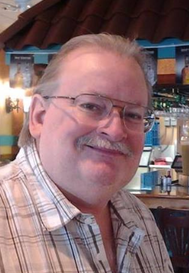 Novelist John TuckerI'm delighted to welcome multi-genre novelist John Tucker to my blog today. I'm in awe of a writer who can turn his talents to so many different types of fiction! With no further ado, let's give a warm welcome to John, and get going with the questions.
Novelist John TuckerI'm delighted to welcome multi-genre novelist John Tucker to my blog today. I'm in awe of a writer who can turn his talents to so many different types of fiction! With no further ado, let's give a warm welcome to John, and get going with the questions.
Tell me a little about yourself – who John Tucker is, your writing background, etc.
John Tucker the author began when I was forty-five. My sons were on their own, my third wife and I parted ways, and the middle-aged crazy man that remained decided to write the novel I always knew I had in me. My first effort was crap. From my voracious reading habits I constructed a decent story but my grammar and characters were flat and unimpressive. After a few months of English classes at a local community college, and the help of fellow authors at an online writing/critique group, I fine-tuned my writing and published my first novel – Romancing the Fox. A dozen books later, I'm building a following and making a name for myself as an impresario that concentrates on the dark side of literature.
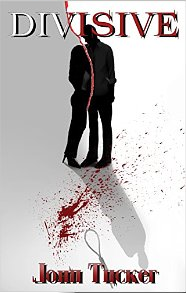 You're a multi-genre author. What's your favourite, and why?
You're a multi-genre author. What's your favourite, and why?
I like writing my thrillers – Divisive, The Fifth Game, Splits in the Skin, and Mouse and Katt. Inventing dark and malevolent characters , even in my lighter efforts, are what gets my juices flowing. A serial killer named Dennis Rask. Moses Bailey, a leader/preacher who protects his homeland and relatives with a single-minded ferocity. There's also Tatyana Stoyava, a Ukrainian immigrant with a switch-blade mentality who gets off on seductions that usually ends with a permanent finality. Everyone who reads, or watches movies for that matter, cheers on the hero or heroine – they're the appetizers and dessert. Still, the villain is always the one they remember – they're the main course that drives a novel.
Will you branch out into any new ones? If so, which?
So far I've written Psychological Thrillers, Paranormal Romance, Adult Contemporary, a YA Mystery, and Erotica. I doubt if I'll venture into any genres other than those but, if I did, I'd delve into Horror. I've never written a novel that deals with otherworldly monsters but when I come up with a storyline that does, I'll be right on it. I can tell you for certain it WON'T deal with Vampires, Werewolves, or Zombies.
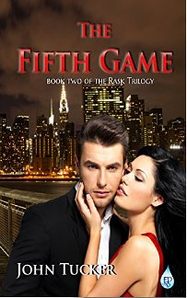 Are there any genres you’d steer clear of?
Are there any genres you’d steer clear of?
Any genre that proliferates the literature as we know it now. Paranormal Romance, Chick-lit, and Pure Romance. I don't like Sci-Fi or Steampunk so they would also be out of my realm of writing.
When did you start writing?
I attempted a few short stories in high school and began a novel that was never completed. Once I hit 45, I decided to make my hobby writing and eventually grew good enough to have a few published.
What do you find the biggest challenge as an author?
The biggest challenges are the technical aspects – editing, formatting, and publishing. Little by little I'm improving on them with the help of videos, blog articles, and friends.
And the biggest joy?
The best part is hearing good comments about my stories from strangers, and reading a great review on any of my novels. When readers ask me questions about the book they just read, it totally makes my day.
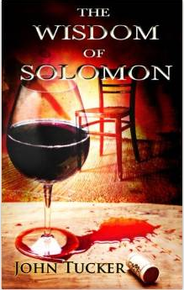 Are you a planner or a pantser? How long does it take to complete each of your novels?
Are you a planner or a pantser? How long does it take to complete each of your novels?
My first three books were pantsers – Divisive, Romancing the Fox, and The Little Girl You Kiss Goodnight. I wrote them from start to finish without formally plotting a thing, probably because they had all been simmering in my mind for several years before I started writing. The last nine have been planned, usually with a chapter by chapter progression of how I want the story to flow from start to finish. Some things will change but the road map I draw stays on course.
Your covers are very striking. Do you design them yourself?
Oh, I wish. I have NO artistic talent whatsoever. I have a hard enough time drawing a straight stick figure. No, all my novels have been created by my more talented friends – Liz Smith, Julie Nicholls, and my publishers cover artist, Kim Barton.
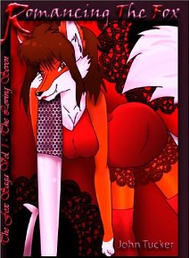 How much of yourself – your life, your values, your opinions – do you put into your novels?
How much of yourself – your life, your values, your opinions – do you put into your novels?
Most of my novels will feature an anti-authoritarian, anti-organized religion, or anti-political subtext. All three subjects are a personal sore spot with me. The majority of religious leaders and all politicians are in their careers for the money. They don't care about the middle-class, live to beg for money in monthly donation telecasts, and help the poor only to further their own goals. On a lighter note, every novel of mine will have a little piece of me in the main character. Be it morals, mannerisms, habits, personality, or features.
What are your writing plans for 2015?
To increase my following and sales, release four novels, and start an editing business on the side. I see so many books that really need an editor and, most of the time, finances are the reason the books are so cringe-worthy. I'll work with my clients on the price and pay it forward on the people that have helped me in the past.
Thank you, John, for a fascinating interview!
You can find out more about John Tucker and his books via hisblog, Facebook page, and his Amazon author page. Simply click the links. You can also tweet with John via Twitter.
Enjoyed this post? Please share via the links below:
Why not subscribe to my blog?
 If you've enjoyed this blog post, how about subscribing via RSS feed or email? Either click the links in my blog sidebar or sign up via Networked Blogs, also in the sidebar. It'll be great to have you on board!
If you've enjoyed this blog post, how about subscribing via RSS feed or email? Either click the links in my blog sidebar or sign up via Networked Blogs, also in the sidebar. It'll be great to have you on board!
Want early bird discounts on my future releases, as well as information about special promotions and giveaways? Simply enter your details in the form here, or at the top of the sidebar. I respect your privacy and will never sell your details to any third parties.
 Novelist John TuckerI'm delighted to welcome multi-genre novelist John Tucker to my blog today. I'm in awe of a writer who can turn his talents to so many different types of fiction! With no further ado, let's give a warm welcome to John, and get going with the questions.
Novelist John TuckerI'm delighted to welcome multi-genre novelist John Tucker to my blog today. I'm in awe of a writer who can turn his talents to so many different types of fiction! With no further ado, let's give a warm welcome to John, and get going with the questions.Tell me a little about yourself – who John Tucker is, your writing background, etc.
John Tucker the author began when I was forty-five. My sons were on their own, my third wife and I parted ways, and the middle-aged crazy man that remained decided to write the novel I always knew I had in me. My first effort was crap. From my voracious reading habits I constructed a decent story but my grammar and characters were flat and unimpressive. After a few months of English classes at a local community college, and the help of fellow authors at an online writing/critique group, I fine-tuned my writing and published my first novel – Romancing the Fox. A dozen books later, I'm building a following and making a name for myself as an impresario that concentrates on the dark side of literature.
 You're a multi-genre author. What's your favourite, and why?
You're a multi-genre author. What's your favourite, and why?
I like writing my thrillers – Divisive, The Fifth Game, Splits in the Skin, and Mouse and Katt. Inventing dark and malevolent characters , even in my lighter efforts, are what gets my juices flowing. A serial killer named Dennis Rask. Moses Bailey, a leader/preacher who protects his homeland and relatives with a single-minded ferocity. There's also Tatyana Stoyava, a Ukrainian immigrant with a switch-blade mentality who gets off on seductions that usually ends with a permanent finality. Everyone who reads, or watches movies for that matter, cheers on the hero or heroine – they're the appetizers and dessert. Still, the villain is always the one they remember – they're the main course that drives a novel.
Will you branch out into any new ones? If so, which?
So far I've written Psychological Thrillers, Paranormal Romance, Adult Contemporary, a YA Mystery, and Erotica. I doubt if I'll venture into any genres other than those but, if I did, I'd delve into Horror. I've never written a novel that deals with otherworldly monsters but when I come up with a storyline that does, I'll be right on it. I can tell you for certain it WON'T deal with Vampires, Werewolves, or Zombies.
 Are there any genres you’d steer clear of?
Are there any genres you’d steer clear of?Any genre that proliferates the literature as we know it now. Paranormal Romance, Chick-lit, and Pure Romance. I don't like Sci-Fi or Steampunk so they would also be out of my realm of writing.
When did you start writing?
I attempted a few short stories in high school and began a novel that was never completed. Once I hit 45, I decided to make my hobby writing and eventually grew good enough to have a few published.
What do you find the biggest challenge as an author?
The biggest challenges are the technical aspects – editing, formatting, and publishing. Little by little I'm improving on them with the help of videos, blog articles, and friends.
And the biggest joy?
The best part is hearing good comments about my stories from strangers, and reading a great review on any of my novels. When readers ask me questions about the book they just read, it totally makes my day.
 Are you a planner or a pantser? How long does it take to complete each of your novels?
Are you a planner or a pantser? How long does it take to complete each of your novels?My first three books were pantsers – Divisive, Romancing the Fox, and The Little Girl You Kiss Goodnight. I wrote them from start to finish without formally plotting a thing, probably because they had all been simmering in my mind for several years before I started writing. The last nine have been planned, usually with a chapter by chapter progression of how I want the story to flow from start to finish. Some things will change but the road map I draw stays on course.
Your covers are very striking. Do you design them yourself?
Oh, I wish. I have NO artistic talent whatsoever. I have a hard enough time drawing a straight stick figure. No, all my novels have been created by my more talented friends – Liz Smith, Julie Nicholls, and my publishers cover artist, Kim Barton.
 How much of yourself – your life, your values, your opinions – do you put into your novels?
How much of yourself – your life, your values, your opinions – do you put into your novels?Most of my novels will feature an anti-authoritarian, anti-organized religion, or anti-political subtext. All three subjects are a personal sore spot with me. The majority of religious leaders and all politicians are in their careers for the money. They don't care about the middle-class, live to beg for money in monthly donation telecasts, and help the poor only to further their own goals. On a lighter note, every novel of mine will have a little piece of me in the main character. Be it morals, mannerisms, habits, personality, or features.
What are your writing plans for 2015?
To increase my following and sales, release four novels, and start an editing business on the side. I see so many books that really need an editor and, most of the time, finances are the reason the books are so cringe-worthy. I'll work with my clients on the price and pay it forward on the people that have helped me in the past.
Thank you, John, for a fascinating interview!
You can find out more about John Tucker and his books via hisblog, Facebook page, and his Amazon author page. Simply click the links. You can also tweet with John via Twitter.
Enjoyed this post? Please share via the links below:
Why not subscribe to my blog?
 If you've enjoyed this blog post, how about subscribing via RSS feed or email? Either click the links in my blog sidebar or sign up via Networked Blogs, also in the sidebar. It'll be great to have you on board!
If you've enjoyed this blog post, how about subscribing via RSS feed or email? Either click the links in my blog sidebar or sign up via Networked Blogs, also in the sidebar. It'll be great to have you on board!Want early bird discounts on my future releases, as well as information about special promotions and giveaways? Simply enter your details in the form here, or at the top of the sidebar. I respect your privacy and will never sell your details to any third parties.
Published on March 31, 2015 06:44
March 25, 2015
Should you judge a book by its cover?
By Maggie James
‘Don't judge a book by its cover’ is an oft-quoted maxim, meaning we shouldn't prejudge the value of something or someone by outward appearances. The fact is, when buying books, many of us do exactly that. And why not? Whilst it's not the only criterion on which to judge a book, I suspect most of us are drawn to a compelling cover. First appearances count.
Why? Because a good cover discloses what's inside. Check out these examples. I bet you’re able to discern the book's genre in every case. Every picture tells a story, as the saying goes! Wouldn’t you be disappointed, even angry, if you chose a book that appears to be a fantasy epic, and then discovered it's something different?
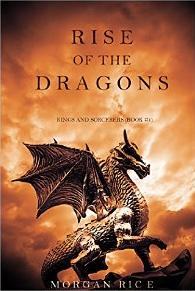
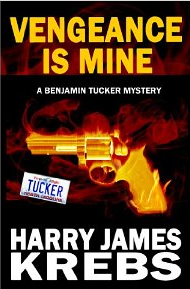
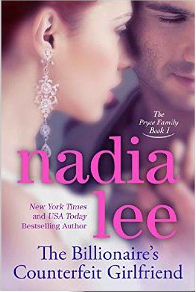 Case study - Mark Tilbury's novel The Revelation Room
Case study - Mark Tilbury's novel The Revelation Room
It's easy for self-published authors to get it wrong with their covers. The temptation is to save money by doing one's own, but it's often a false economy. Why? Because most writers don't have the graphic design skills required. To illustrate my point, I'll use author Mark Tilbury's psychological thriller, The Revelation Room (to be released on May 6, 2015).
First, some brief details about the book, the first in a series. The main character, Ben Whittle, works in his father’s private investigation business. After Ben’s father goes missing whilst trying to locate a girl who has joined a religious cult, it soon becomes apparent to Ben that he will have to infiltrate the cult to rescue his father. He's an extremely reluctant hero, however...
Exciting stuff! You can find out more via Mark My Words. Look out for my forthcoming interview with Mark.
Mark admits that, at first, he tried a DIY approach. In the end, he bit the bullet and hired a designer. Here are the 'before and after' results:
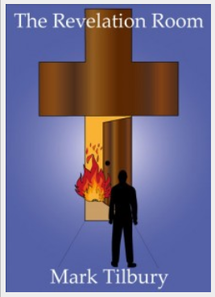 Before - Mark's DIY attempt via Adobe Illustrator
Before - Mark's DIY attempt via Adobe Illustrator
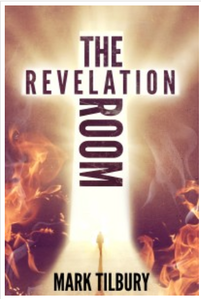 After - much more eye-catching! Less can be more for book covers...
After - much more eye-catching! Less can be more for book covers...
Whilst the ‘before’ cover’s not great, it's better than anything I could knock up! I tried doing my own, but it soon became apparent I don't have what it takes. Nowadays, my graphic designer Donna Casey takes care of my book covers, and she's done a fantastic job. Check them out here.
I asked Donna what mistakes DIY-ers make. ‘Putting an illegible title on a busy background,’ she replied. ‘When the cover is shrunk down on Amazon, the design becomes a garbled mess. Also, many authors want lots of details from their book on the cover and it makes it too cluttered. When they cut stuff out, the cover takes on a more pleasing appearance.’
She’s right. Simple designs are more effective than overstuffed ones. Take these three examples from one of my favourite novelists, Tony Parsons. Aren't they perfect examples of ‘less is more’?
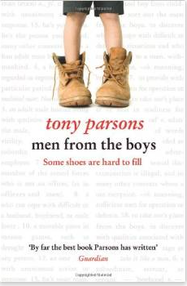
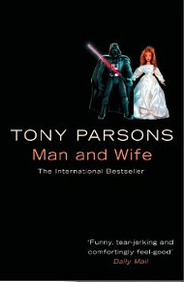
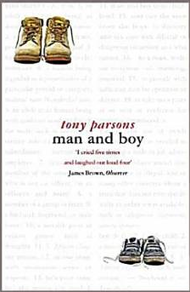 What do you think?
What do you think?
What about you? Are you influenced by a book's cover when buying fiction? Would a poor design be a turn-off? Have you ever read a book and found the contents didn’t match up to the cover? Leave a comment and let me know!
Enjoyed this post? Please share via the buttons below!
Why not subscribe to my blog?
 If you've enjoyed this blog post, how about subscribing via RSS feed or email? Either click the links in my blog sidebar or sign up via Networked Blogs, also in the sidebar. It'll be great to have you on board!
If you've enjoyed this blog post, how about subscribing via RSS feed or email? Either click the links in my blog sidebar or sign up via Networked Blogs, also in the sidebar. It'll be great to have you on board!
Want early bird discounts on my future releases, as well as information about special promotions and giveaways? Simply enter your details in the formhere, or at the top of the sidebar. I respect your privacy and will never sell your details to any third parties.
‘Don't judge a book by its cover’ is an oft-quoted maxim, meaning we shouldn't prejudge the value of something or someone by outward appearances. The fact is, when buying books, many of us do exactly that. And why not? Whilst it's not the only criterion on which to judge a book, I suspect most of us are drawn to a compelling cover. First appearances count.
Why? Because a good cover discloses what's inside. Check out these examples. I bet you’re able to discern the book's genre in every case. Every picture tells a story, as the saying goes! Wouldn’t you be disappointed, even angry, if you chose a book that appears to be a fantasy epic, and then discovered it's something different?


 Case study - Mark Tilbury's novel The Revelation Room
Case study - Mark Tilbury's novel The Revelation RoomIt's easy for self-published authors to get it wrong with their covers. The temptation is to save money by doing one's own, but it's often a false economy. Why? Because most writers don't have the graphic design skills required. To illustrate my point, I'll use author Mark Tilbury's psychological thriller, The Revelation Room (to be released on May 6, 2015).
First, some brief details about the book, the first in a series. The main character, Ben Whittle, works in his father’s private investigation business. After Ben’s father goes missing whilst trying to locate a girl who has joined a religious cult, it soon becomes apparent to Ben that he will have to infiltrate the cult to rescue his father. He's an extremely reluctant hero, however...
Exciting stuff! You can find out more via Mark My Words. Look out for my forthcoming interview with Mark.
Mark admits that, at first, he tried a DIY approach. In the end, he bit the bullet and hired a designer. Here are the 'before and after' results:
 Before - Mark's DIY attempt via Adobe Illustrator
Before - Mark's DIY attempt via Adobe Illustrator
 After - much more eye-catching! Less can be more for book covers...
After - much more eye-catching! Less can be more for book covers...Whilst the ‘before’ cover’s not great, it's better than anything I could knock up! I tried doing my own, but it soon became apparent I don't have what it takes. Nowadays, my graphic designer Donna Casey takes care of my book covers, and she's done a fantastic job. Check them out here.
I asked Donna what mistakes DIY-ers make. ‘Putting an illegible title on a busy background,’ she replied. ‘When the cover is shrunk down on Amazon, the design becomes a garbled mess. Also, many authors want lots of details from their book on the cover and it makes it too cluttered. When they cut stuff out, the cover takes on a more pleasing appearance.’
She’s right. Simple designs are more effective than overstuffed ones. Take these three examples from one of my favourite novelists, Tony Parsons. Aren't they perfect examples of ‘less is more’?


 What do you think?
What do you think?What about you? Are you influenced by a book's cover when buying fiction? Would a poor design be a turn-off? Have you ever read a book and found the contents didn’t match up to the cover? Leave a comment and let me know!
Enjoyed this post? Please share via the buttons below!
Why not subscribe to my blog?
 If you've enjoyed this blog post, how about subscribing via RSS feed or email? Either click the links in my blog sidebar or sign up via Networked Blogs, also in the sidebar. It'll be great to have you on board!
If you've enjoyed this blog post, how about subscribing via RSS feed or email? Either click the links in my blog sidebar or sign up via Networked Blogs, also in the sidebar. It'll be great to have you on board!Want early bird discounts on my future releases, as well as information about special promotions and giveaways? Simply enter your details in the formhere, or at the top of the sidebar. I respect your privacy and will never sell your details to any third parties.
Published on March 25, 2015 08:05
March 18, 2015
Interview with thriller writer Martyn Waites
By Maggie James
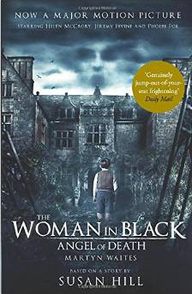 A while back, I posted a review of 'The White Room' by bestselling thriller writer Martyn Waites. I'm delighted to welcome the man himself to my blog today. Here's our discussion:
A while back, I posted a review of 'The White Room' by bestselling thriller writer Martyn Waites. I'm delighted to welcome the man himself to my blog today. Here's our discussion:
Tell us about your latest novel, The Woman in Black: Angel of Death.
Well, it’s something I’m particularly proud of. At first I thought I was just going to be writing a film tie-in which I thought would be fun because I hadn’t done anything like that before. Also I’m a huge Hammer Film fan and to have my name and Hammer on the spine of a book was enough for me, really. Plus it was a complete departure from anything I had written before. The opposite of my usual stuff, really.
But … then I was told this wasn’t just to coincide with the new film but was going to be the official sequel to the novel itself. And then I found myself in the papers answering questions. And then I realised I’d taken on quite a daunting task.
But I wrote it and really enjoyed it. It’s different to the first one and different to the film as well. I saw it as my chance to use every gothic trope that I could think of, making homages to all the great writers and filmmakers who had so excited me. So Poe is in there, a bit of M R James, hopefully a bit of Terence Fisher . . . Great fun to write.
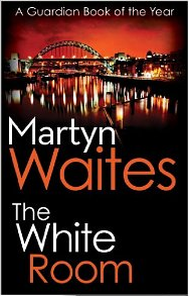 What’s next for you on the writing front?
What’s next for you on the writing front?
Another Tania Carver novel. The latest, Heartbreaker, is out this year (in ebook and trade paperback in July and paperback in October). I’m just starting the 2016’s Tania now, tentatively called The Hanged Man. I’m quite excited by this one. I think I’ve come up with a belter of a plot. I just hope I can do justice to it.
Has your early career as an actor helped you with your novel writing? Do you see yourself returning to acting in the future?
I don’t know. It’s probably a never say never thing. I have no plans to return to acting but I would listen to offers. However, I’ve been out of it for so long I doubt I’ll get any offers. Also, I used to love theatre; that was my real passion, more than TV or anything else. But the thought of committing myself to a long run now doesn’t really appeal.
As to whether it’s helped in my writing: yes, I think so. I find creating characters for the page the same as creating them onstage. I use the same intuitive processes as I would as an actor. Find the voice, the look, the walk, etc. And also, I find dialogue very easy to write. I think that’s down to my actor background.
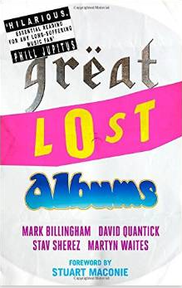 You’ve already branched out from crime fiction into horror with The Woman in Black: Angel of Death. Do you see yourself writing more horror novels?
You’ve already branched out from crime fiction into horror with The Woman in Black: Angel of Death. Do you see yourself writing more horror novels?
Yeah, I’d love to. I’ve got a couple of ideas (at least) kicking around in my head at the moment that are more horror than crime. I’m just looking for the right outlet for them. Not to mention the time to sit down and write them.
Will you venture into any other genres? If so, which ones?
I already have. I’ve ventured into music journalism. Great Lost Albums came out last autumn. It was a collaboration between myself, Mark Billingham, Stav Sherez and David Quantick. We spent years trying to track down albums that we had only heard whispers about, legendary albums that may never have even existed . . .
No we didn’t. It was a comedy book. Mark and I were trying to entertain each other on a train one day when we were out on tour together. What would Morrissey’s great lost panto album sound like? What if Pete Townsend did a rock opera about a deaf, dumb and blind bingo caller called Bingo Wizard? What if Coldplay became IKEA’s resident house band? Those kinds of things. Just to entertain ourselves really. By the time we’d got back to London we thought we had a book there. So we roped in Stav, who is of course a brilliant crime novelist but also used to be a music journalist, and Dave Quantick who also used to be a music journalist but who’s now better known for writing for the BAFTA winning Harry Hill’s TV Burp, The Thick of It and the Emmy-winning Veep. Then it was just a question of coming up with fifty albums that made us all laugh.
The book came out last autumn and despite being the funniest book ever written, kind of disappeared. So it was back to the day job.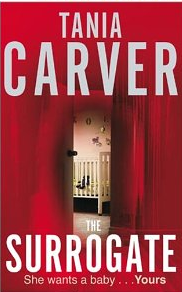 You also write as Tania Carver. How different is that from being Martyn Waites?
You also write as Tania Carver. How different is that from being Martyn Waites?
Well, there’s the name for a start. It’s interesting. Tania (if I can refer to myself/herself in the third person) is different from Martyn. The books are slightly different. They’re all crime novels but with the Tanias there are changes of emphasis, there are scenes that I wouldn’t put in a Tania that I’d keep for a Martyn. And vice versa. I don’t actually know what the differences are but I can feel them when I’m writing. I guess it’s like how it must have been for Donald Westlake writing as Richard Stark. The same, but different. Flexing different muscles, playing different chords. That kind of thing. Or at least that’s how I think of it.
The other thing is writing under a female pseudonym. When the first Tania came out, The Surrogate, it was a massive bestseller, both here and internationally. I can remember standing in WHSmiths where it was book of the week and watching people come in, pick it up and take it to the till. And of course I couldn’t say anything. Well, not without being forcibly ejected from the shop. I’ve got used to it now though. Tania is kind of my main writing at the moment. But doing things like Woman in Black and Great Lost Albums help to keep me and the series fresh.
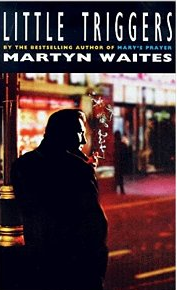 Tell us how American crime fiction of the Nineties influenced your early work.
Tell us how American crime fiction of the Nineties influenced your early work.
Wow, you’ve done your homework. Or you’ve heard me blathering on about this at great length, usually when I’ve had a drink.
It was the late eighties and I was casting around for my ‘thing’. I was already acting and had what other people thought of as a promising career (which I think meant I was working and not unemployed). I loved reading and had tried everything but nothing seemed to stick, nothing spoke to me, moved me. Until I read Chandler. Then Hammett, then Ross MacDonald. Then James M Cain . . . and on and on. Actually this was in the mid-eighties when I was still at college. When I left I was still reading the old school stuff. I hated British crime writing at the time. Parochial, dull, boring. No connection with me or my life. Then I looked back at some of the neglected British writers like Ted Lewis, Gerald Kersh and, my favourite, Patrick Hamilton and wished we had people like that still writing.
So I had a look at some of the American writing that was starting to appear then. And it was a pretty fertile time for it. Like punk and new wave happened over here in the late seventies and revitalised the culture, in the late eighties the same thing happened with American crime fiction. I read Andrew Vachss and it was like someone hadn’t just opened the windows onto a world, they had blown the side of the house off. James Ellroy next, then James Lee Burke, James Crumley, Walter Mosely, Sara Paretsky . . . wow. On and on. And that was when I realised I had found my thing. They wrote about urban landscapes I could recognise, about lives and struggles I could relate to. It was real life reportage, spat back as literature. And I couldn’t get enough of it.
And then I thought (because I was already telling myself I was going to write a novel), why don’t I do what they’re doing? Transpose it for the UK but bring that energy, that sense of engagement the politics, the anger with it? Yeah, why not? I realised that quite a few other British writers were having the same idea at the same time. It just took some of us longer to actually get into print.
But they were my literary touchstones, the ones who inspired me.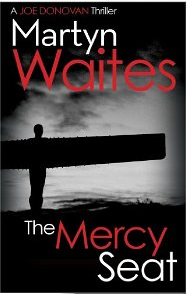 You’ve held writing residences in prisons. Do you know if any of your students have published their work? How rewarding did you find encouraging offenders to write?
You’ve held writing residences in prisons. Do you know if any of your students have published their work? How rewarding did you find encouraging offenders to write?
I don’t know if I’ve actually led anyone to be a writer. There were some who were definitely good enough but I don’t know if they have or not. I worked as a writer in residence in a young offenders institution for two and a half years. Then for another year in an adult prison. To be honest, I could write a book on it. It was the most unique experience. It was the most polarised environment I’ve ever worked in. One day you’d be feeling like you could touch the stars, the next like you wished you were shelf-stacking at Budgens. Successes were stratospheric, failures equally so in the wrong direction. It was an honour to try and use my skills to effect a positive change in someone’s life.
Tell us a little about the writing process for you. How long does an average novel take? How difficult (or not) are you to live with when creating a novel? Are you a planner or someone who writes by the seat of their pants?
So many questions in that one question . . . Okay, here goes. I can answer the second bit first. How difficult am I to live with when I’m writing? Very. I sometimes put off starting a book because I know that it’s going to change me. It’s like you can never switch off and your mind is always on the work. At my best I’m kind of semi-detached while I’m working. At worst I’m the kind of writer that people go and stay with their relatives rather than be with.
Do I plan or make it up? Kind of both, really. I know that sounds diametrically opposed, but it’s not. I usually start with an idea or an image. That then suggests questions to me. And it takes the course of the book for me to answer them. I usually say that the first hundred pages or so are like an audition. It’s me finding out who the characters are, why they’re there, what they sound like . . . all of that. And the ones with the most interesting voices are the ones I want to stick with. Then I can see a structure developing so I start to plan ahead a little. Maybe fifty or a hundred pages or so. Then after that, take stock and plan the next section. And so on.
As for how long it takes, I don’t know. I try and allow myself a year to write a novel but always hope it takes less than that and I can fit something else in as well. But it varies. The longest it took me to write a book was five years. The shortest, three months. There are no hard and fast rules. And I also feel when I sit down to start the next book that I’ve learned absolutely nothing for my previous books. A blank screen is always a blank screen. And it’s up to me to be as creative as possible in how I fill it.
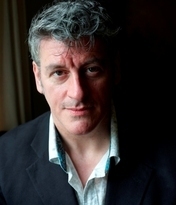 Bestselling novelist Martyn Waites Finally, tell us something weird and wonderful about yourself that your readers might not know.
Bestselling novelist Martyn Waites Finally, tell us something weird and wonderful about yourself that your readers might not know.
To be honest, I don’t think there’s anything weird - and certainly nothing wonderful - about me. I kind of wear my passions on my sleeve so most people know my politics, my interests, all of that. I can’t really think of anything. I’m a huge Doctor Who fan, right back to 1963. I love my pulp fiction, my horror movies, my film noir, my comics . . . possibly the only thing that not many people know about me is that I like modelling. Not on the catwalk, obviously, but making models. I’ve got a scale replica of Frankenstein’s monster and the Bride of Frankenstein from the film of the same name to work on next. I’m looking forward to that. Once I’ve finished my Doctor Jekyll and Mister Hyde model, that is. I enjoy it. The solitude, the concentration. You can listen to music while you work, which I can’t while I’m writing. And it uses another part of my brain to the writing part, lets me flex some other mental muscles. Love it. I used to win competitions for it when I was little.
And that’s something not many people know.
Thank you, Martyn! It's been a pleasure to talk with you.
You can find out more about Martyn and his books, including the Tania Carver ones, via his website. Or you can connect with him onTwitter.
Like this post? Click the links below to share!
Subscribe to my newsletter and blog!
 I'd love to stay in contact with you! Why not sign up for my newsletter? It's an occasional communication to keep you informed about my new novel releases. I respect your privacy and will never sell your details to any third parties. To sign up, enter your details in the form at the top of the sidebar.
I'd love to stay in contact with you! Why not sign up for my newsletter? It's an occasional communication to keep you informed about my new novel releases. I respect your privacy and will never sell your details to any third parties. To sign up, enter your details in the form at the top of the sidebar.
And if you've enjoyed this blog post, how about subscribing via RSS feed or email? Either click the links in my blog sidebar or sign up via Networked Blogs, also in the sidebar. It'll be great to have you on board!
 A while back, I posted a review of 'The White Room' by bestselling thriller writer Martyn Waites. I'm delighted to welcome the man himself to my blog today. Here's our discussion:
A while back, I posted a review of 'The White Room' by bestselling thriller writer Martyn Waites. I'm delighted to welcome the man himself to my blog today. Here's our discussion:Tell us about your latest novel, The Woman in Black: Angel of Death.
Well, it’s something I’m particularly proud of. At first I thought I was just going to be writing a film tie-in which I thought would be fun because I hadn’t done anything like that before. Also I’m a huge Hammer Film fan and to have my name and Hammer on the spine of a book was enough for me, really. Plus it was a complete departure from anything I had written before. The opposite of my usual stuff, really.
But … then I was told this wasn’t just to coincide with the new film but was going to be the official sequel to the novel itself. And then I found myself in the papers answering questions. And then I realised I’d taken on quite a daunting task.
But I wrote it and really enjoyed it. It’s different to the first one and different to the film as well. I saw it as my chance to use every gothic trope that I could think of, making homages to all the great writers and filmmakers who had so excited me. So Poe is in there, a bit of M R James, hopefully a bit of Terence Fisher . . . Great fun to write.
 What’s next for you on the writing front?
What’s next for you on the writing front?
Another Tania Carver novel. The latest, Heartbreaker, is out this year (in ebook and trade paperback in July and paperback in October). I’m just starting the 2016’s Tania now, tentatively called The Hanged Man. I’m quite excited by this one. I think I’ve come up with a belter of a plot. I just hope I can do justice to it.
Has your early career as an actor helped you with your novel writing? Do you see yourself returning to acting in the future?
I don’t know. It’s probably a never say never thing. I have no plans to return to acting but I would listen to offers. However, I’ve been out of it for so long I doubt I’ll get any offers. Also, I used to love theatre; that was my real passion, more than TV or anything else. But the thought of committing myself to a long run now doesn’t really appeal.
As to whether it’s helped in my writing: yes, I think so. I find creating characters for the page the same as creating them onstage. I use the same intuitive processes as I would as an actor. Find the voice, the look, the walk, etc. And also, I find dialogue very easy to write. I think that’s down to my actor background.
 You’ve already branched out from crime fiction into horror with The Woman in Black: Angel of Death. Do you see yourself writing more horror novels?
You’ve already branched out from crime fiction into horror with The Woman in Black: Angel of Death. Do you see yourself writing more horror novels?Yeah, I’d love to. I’ve got a couple of ideas (at least) kicking around in my head at the moment that are more horror than crime. I’m just looking for the right outlet for them. Not to mention the time to sit down and write them.
Will you venture into any other genres? If so, which ones?
I already have. I’ve ventured into music journalism. Great Lost Albums came out last autumn. It was a collaboration between myself, Mark Billingham, Stav Sherez and David Quantick. We spent years trying to track down albums that we had only heard whispers about, legendary albums that may never have even existed . . .
No we didn’t. It was a comedy book. Mark and I were trying to entertain each other on a train one day when we were out on tour together. What would Morrissey’s great lost panto album sound like? What if Pete Townsend did a rock opera about a deaf, dumb and blind bingo caller called Bingo Wizard? What if Coldplay became IKEA’s resident house band? Those kinds of things. Just to entertain ourselves really. By the time we’d got back to London we thought we had a book there. So we roped in Stav, who is of course a brilliant crime novelist but also used to be a music journalist, and Dave Quantick who also used to be a music journalist but who’s now better known for writing for the BAFTA winning Harry Hill’s TV Burp, The Thick of It and the Emmy-winning Veep. Then it was just a question of coming up with fifty albums that made us all laugh.
The book came out last autumn and despite being the funniest book ever written, kind of disappeared. So it was back to the day job.
 You also write as Tania Carver. How different is that from being Martyn Waites?
You also write as Tania Carver. How different is that from being Martyn Waites?
Well, there’s the name for a start. It’s interesting. Tania (if I can refer to myself/herself in the third person) is different from Martyn. The books are slightly different. They’re all crime novels but with the Tanias there are changes of emphasis, there are scenes that I wouldn’t put in a Tania that I’d keep for a Martyn. And vice versa. I don’t actually know what the differences are but I can feel them when I’m writing. I guess it’s like how it must have been for Donald Westlake writing as Richard Stark. The same, but different. Flexing different muscles, playing different chords. That kind of thing. Or at least that’s how I think of it.
The other thing is writing under a female pseudonym. When the first Tania came out, The Surrogate, it was a massive bestseller, both here and internationally. I can remember standing in WHSmiths where it was book of the week and watching people come in, pick it up and take it to the till. And of course I couldn’t say anything. Well, not without being forcibly ejected from the shop. I’ve got used to it now though. Tania is kind of my main writing at the moment. But doing things like Woman in Black and Great Lost Albums help to keep me and the series fresh.
 Tell us how American crime fiction of the Nineties influenced your early work.
Tell us how American crime fiction of the Nineties influenced your early work.Wow, you’ve done your homework. Or you’ve heard me blathering on about this at great length, usually when I’ve had a drink.
It was the late eighties and I was casting around for my ‘thing’. I was already acting and had what other people thought of as a promising career (which I think meant I was working and not unemployed). I loved reading and had tried everything but nothing seemed to stick, nothing spoke to me, moved me. Until I read Chandler. Then Hammett, then Ross MacDonald. Then James M Cain . . . and on and on. Actually this was in the mid-eighties when I was still at college. When I left I was still reading the old school stuff. I hated British crime writing at the time. Parochial, dull, boring. No connection with me or my life. Then I looked back at some of the neglected British writers like Ted Lewis, Gerald Kersh and, my favourite, Patrick Hamilton and wished we had people like that still writing.
So I had a look at some of the American writing that was starting to appear then. And it was a pretty fertile time for it. Like punk and new wave happened over here in the late seventies and revitalised the culture, in the late eighties the same thing happened with American crime fiction. I read Andrew Vachss and it was like someone hadn’t just opened the windows onto a world, they had blown the side of the house off. James Ellroy next, then James Lee Burke, James Crumley, Walter Mosely, Sara Paretsky . . . wow. On and on. And that was when I realised I had found my thing. They wrote about urban landscapes I could recognise, about lives and struggles I could relate to. It was real life reportage, spat back as literature. And I couldn’t get enough of it.
And then I thought (because I was already telling myself I was going to write a novel), why don’t I do what they’re doing? Transpose it for the UK but bring that energy, that sense of engagement the politics, the anger with it? Yeah, why not? I realised that quite a few other British writers were having the same idea at the same time. It just took some of us longer to actually get into print.
But they were my literary touchstones, the ones who inspired me.
 You’ve held writing residences in prisons. Do you know if any of your students have published their work? How rewarding did you find encouraging offenders to write?
You’ve held writing residences in prisons. Do you know if any of your students have published their work? How rewarding did you find encouraging offenders to write?I don’t know if I’ve actually led anyone to be a writer. There were some who were definitely good enough but I don’t know if they have or not. I worked as a writer in residence in a young offenders institution for two and a half years. Then for another year in an adult prison. To be honest, I could write a book on it. It was the most unique experience. It was the most polarised environment I’ve ever worked in. One day you’d be feeling like you could touch the stars, the next like you wished you were shelf-stacking at Budgens. Successes were stratospheric, failures equally so in the wrong direction. It was an honour to try and use my skills to effect a positive change in someone’s life.
Tell us a little about the writing process for you. How long does an average novel take? How difficult (or not) are you to live with when creating a novel? Are you a planner or someone who writes by the seat of their pants?
So many questions in that one question . . . Okay, here goes. I can answer the second bit first. How difficult am I to live with when I’m writing? Very. I sometimes put off starting a book because I know that it’s going to change me. It’s like you can never switch off and your mind is always on the work. At my best I’m kind of semi-detached while I’m working. At worst I’m the kind of writer that people go and stay with their relatives rather than be with.
Do I plan or make it up? Kind of both, really. I know that sounds diametrically opposed, but it’s not. I usually start with an idea or an image. That then suggests questions to me. And it takes the course of the book for me to answer them. I usually say that the first hundred pages or so are like an audition. It’s me finding out who the characters are, why they’re there, what they sound like . . . all of that. And the ones with the most interesting voices are the ones I want to stick with. Then I can see a structure developing so I start to plan ahead a little. Maybe fifty or a hundred pages or so. Then after that, take stock and plan the next section. And so on.
As for how long it takes, I don’t know. I try and allow myself a year to write a novel but always hope it takes less than that and I can fit something else in as well. But it varies. The longest it took me to write a book was five years. The shortest, three months. There are no hard and fast rules. And I also feel when I sit down to start the next book that I’ve learned absolutely nothing for my previous books. A blank screen is always a blank screen. And it’s up to me to be as creative as possible in how I fill it.
 Bestselling novelist Martyn Waites Finally, tell us something weird and wonderful about yourself that your readers might not know.
Bestselling novelist Martyn Waites Finally, tell us something weird and wonderful about yourself that your readers might not know. To be honest, I don’t think there’s anything weird - and certainly nothing wonderful - about me. I kind of wear my passions on my sleeve so most people know my politics, my interests, all of that. I can’t really think of anything. I’m a huge Doctor Who fan, right back to 1963. I love my pulp fiction, my horror movies, my film noir, my comics . . . possibly the only thing that not many people know about me is that I like modelling. Not on the catwalk, obviously, but making models. I’ve got a scale replica of Frankenstein’s monster and the Bride of Frankenstein from the film of the same name to work on next. I’m looking forward to that. Once I’ve finished my Doctor Jekyll and Mister Hyde model, that is. I enjoy it. The solitude, the concentration. You can listen to music while you work, which I can’t while I’m writing. And it uses another part of my brain to the writing part, lets me flex some other mental muscles. Love it. I used to win competitions for it when I was little.
And that’s something not many people know.
Thank you, Martyn! It's been a pleasure to talk with you.
You can find out more about Martyn and his books, including the Tania Carver ones, via his website. Or you can connect with him onTwitter.
Like this post? Click the links below to share!
Subscribe to my newsletter and blog!
 I'd love to stay in contact with you! Why not sign up for my newsletter? It's an occasional communication to keep you informed about my new novel releases. I respect your privacy and will never sell your details to any third parties. To sign up, enter your details in the form at the top of the sidebar.
I'd love to stay in contact with you! Why not sign up for my newsletter? It's an occasional communication to keep you informed about my new novel releases. I respect your privacy and will never sell your details to any third parties. To sign up, enter your details in the form at the top of the sidebar.And if you've enjoyed this blog post, how about subscribing via RSS feed or email? Either click the links in my blog sidebar or sign up via Networked Blogs, also in the sidebar. It'll be great to have you on board!
Published on March 18, 2015 03:14
March 11, 2015
Reading for Solace
Guest post by Susanna Bavin
I'm delighted to welcome Susanna Bavin to my blog this week as a guest blogger. She's going to share her thoughts on the subject of reading as solace. Take it away, Susanna!
Books can provide comfort in times of distress
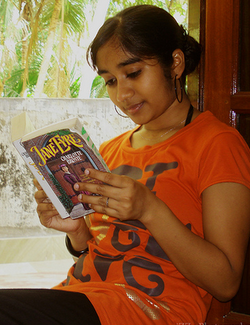 Image courtesy of Easa Shamih A while back, Maggie wrote a blog post covering the various reasons why people choose to read fiction. It was a lively and interesting post, but I felt there was one reason missing: reading for solace. So what does that mean? Obviously, it is closely linked to reading for escapism, but it is a specific type of escapist reading.
Image courtesy of Easa Shamih A while back, Maggie wrote a blog post covering the various reasons why people choose to read fiction. It was a lively and interesting post, but I felt there was one reason missing: reading for solace. So what does that mean? Obviously, it is closely linked to reading for escapism, but it is a specific type of escapist reading.
Solace. According to the Concise OED my parents gave me one Christmas years ago, and which remains my favourite dictionary no matter how many more modern dictionaries have climbed onto the bookcase since, solace is: comfort in distress or discomfort or tedium.
Now I must confess I didn't have tedium in mind when I wrote a reply to Maggie's blog. It was distress I was thinking of.
So what is reading for solace? The best way to explain it is to give you an example. My dad died in his 60s, which came as a brutal shock to the family. Through that first week, I stayed with my mum. Understandably, she had trouble sleeping, but after the first couple of nights, she came downstairs in the morning and showed me a book.
“This stopped me going mad,” she said.
Was it a self-help book? A discussion of grief or widowhood? No, it was a novel. The book that had got my mum through the first endless nights was a story.
I wish I could tell you what it was, but I can't. All I can tell you, based on my mum's reading habits, is that it was written by a woman (or by a man using a woman's name) and the plot was set at some point after the building of the railways. I seem to recall it was a contemporary novel, but I couldn't swear to it.
How myths, legends and folk tales helped one young girl...
 Image courtesy of Helga Weber I remember years ago reading an interview with Dick Francis, who described receiving a letter from a man who had lost a companion in a car accident. The accident happened in the middle of nowhere; no other vehicle was involved. The man walked until he found a phone box, then he returned to the car to await help, knowing his companion was dead. Assistance took a couple of hours to arrive and the man started to read a book that had belonged to his late companion – a Dick Francis novel. In the letter he subsequently wrote, he thanked Dick Francis for keeping his mind off a tragic situation.
Image courtesy of Helga Weber I remember years ago reading an interview with Dick Francis, who described receiving a letter from a man who had lost a companion in a car accident. The accident happened in the middle of nowhere; no other vehicle was involved. The man walked until he found a phone box, then he returned to the car to await help, knowing his companion was dead. Assistance took a couple of hours to arrive and the man started to read a book that had belonged to his late companion – a Dick Francis novel. In the letter he subsequently wrote, he thanked Dick Francis for keeping his mind off a tragic situation.
Another example that comes to mind is linked to the person who introduced me to the phrase reading for solace – a former boss of mine, the late Wendy Drewett, who for many years was the head of library services for children and schools in Buckinghamshire. There was nothing Mrs Drewett didn't know about children's and teenagers' books. She knew about authors, reading development, dyslexia, avid readers, reluctant readers... you name it. Above all, she knew about getting the right book to the right child at the right time.
In the course of her career, she worked alongside many families, teachers and schools and it was from her that I first heard the words reading for solace in connection with children who live with a chronic condition that means they cannot lead an ordinary physical life. (Maybe there is an element of comfort in tedium here?)
An example of this is the wonderful Rosemary Sutcliff, who suffered from juvenile arthritis from the age of two, which left her wheelchair-bound for the rest of her life. Although she famously didn't learn to read until she was nine (why bother when she had such a gifted storyteller for a mother?), she grew up on a diet of legends, myths and folk tales; and it was these, together with her ability to examine things close to her in minute detail, that occupied her mind and her imagination.
Reading for solace? I don't imagine for one moment that Rosemary Sutcliff thought of it that way, any more than the reader of the Dick Francis novel did at the time – any more than my mother did at the time. I don't think it's something you do consciously. I think it's something that, in certain circumstances, simply happens; and you don't realise until afterwards.
What do you think?
And if the author of the book my mum read is reading this blog – thank you.
Thank you, Susanna!
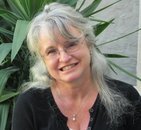 Author Susanna Bavin Many thanks to Susanna for a wonderful post. Let Susanna and me know what you think. Are there any books that have provided solace for you? Do you find comfort in reading when life gets tough? Leave a comment for us!
Author Susanna Bavin Many thanks to Susanna for a wonderful post. Let Susanna and me know what you think. Are there any books that have provided solace for you? Do you find comfort in reading when life gets tough? Leave a comment for us!
Susanna Bavin lives in North Wales and is an author of historical sagas. She also blogs weekly about books and writing. You can find out more from her website, or connect with her on Twitter. If you've enjoyed this post, please share via the buttons below.
Subscribe to my newsletter and blog!
 I'd love to stay in contact with you! Why not sign up for my newsletter? It's an occasional communication to keep you informed about my new novel releases. I respect your privacy and will never sell your details to any third parties. To sign up, enter your details in the form at the top of the sidebar.
I'd love to stay in contact with you! Why not sign up for my newsletter? It's an occasional communication to keep you informed about my new novel releases. I respect your privacy and will never sell your details to any third parties. To sign up, enter your details in the form at the top of the sidebar.
And if you've enjoyed this blog post, how about subscribing via RSS feed or email? Either click the links in my blog sidebar or sign up via Networked Blogs, also in the sidebar. It'll be great to have you on board!
I'm delighted to welcome Susanna Bavin to my blog this week as a guest blogger. She's going to share her thoughts on the subject of reading as solace. Take it away, Susanna!
Books can provide comfort in times of distress
 Image courtesy of Easa Shamih A while back, Maggie wrote a blog post covering the various reasons why people choose to read fiction. It was a lively and interesting post, but I felt there was one reason missing: reading for solace. So what does that mean? Obviously, it is closely linked to reading for escapism, but it is a specific type of escapist reading.
Image courtesy of Easa Shamih A while back, Maggie wrote a blog post covering the various reasons why people choose to read fiction. It was a lively and interesting post, but I felt there was one reason missing: reading for solace. So what does that mean? Obviously, it is closely linked to reading for escapism, but it is a specific type of escapist reading.Solace. According to the Concise OED my parents gave me one Christmas years ago, and which remains my favourite dictionary no matter how many more modern dictionaries have climbed onto the bookcase since, solace is: comfort in distress or discomfort or tedium.
Now I must confess I didn't have tedium in mind when I wrote a reply to Maggie's blog. It was distress I was thinking of.
So what is reading for solace? The best way to explain it is to give you an example. My dad died in his 60s, which came as a brutal shock to the family. Through that first week, I stayed with my mum. Understandably, she had trouble sleeping, but after the first couple of nights, she came downstairs in the morning and showed me a book.
“This stopped me going mad,” she said.
Was it a self-help book? A discussion of grief or widowhood? No, it was a novel. The book that had got my mum through the first endless nights was a story.
I wish I could tell you what it was, but I can't. All I can tell you, based on my mum's reading habits, is that it was written by a woman (or by a man using a woman's name) and the plot was set at some point after the building of the railways. I seem to recall it was a contemporary novel, but I couldn't swear to it.
How myths, legends and folk tales helped one young girl...
 Image courtesy of Helga Weber I remember years ago reading an interview with Dick Francis, who described receiving a letter from a man who had lost a companion in a car accident. The accident happened in the middle of nowhere; no other vehicle was involved. The man walked until he found a phone box, then he returned to the car to await help, knowing his companion was dead. Assistance took a couple of hours to arrive and the man started to read a book that had belonged to his late companion – a Dick Francis novel. In the letter he subsequently wrote, he thanked Dick Francis for keeping his mind off a tragic situation.
Image courtesy of Helga Weber I remember years ago reading an interview with Dick Francis, who described receiving a letter from a man who had lost a companion in a car accident. The accident happened in the middle of nowhere; no other vehicle was involved. The man walked until he found a phone box, then he returned to the car to await help, knowing his companion was dead. Assistance took a couple of hours to arrive and the man started to read a book that had belonged to his late companion – a Dick Francis novel. In the letter he subsequently wrote, he thanked Dick Francis for keeping his mind off a tragic situation.Another example that comes to mind is linked to the person who introduced me to the phrase reading for solace – a former boss of mine, the late Wendy Drewett, who for many years was the head of library services for children and schools in Buckinghamshire. There was nothing Mrs Drewett didn't know about children's and teenagers' books. She knew about authors, reading development, dyslexia, avid readers, reluctant readers... you name it. Above all, she knew about getting the right book to the right child at the right time.
In the course of her career, she worked alongside many families, teachers and schools and it was from her that I first heard the words reading for solace in connection with children who live with a chronic condition that means they cannot lead an ordinary physical life. (Maybe there is an element of comfort in tedium here?)
An example of this is the wonderful Rosemary Sutcliff, who suffered from juvenile arthritis from the age of two, which left her wheelchair-bound for the rest of her life. Although she famously didn't learn to read until she was nine (why bother when she had such a gifted storyteller for a mother?), she grew up on a diet of legends, myths and folk tales; and it was these, together with her ability to examine things close to her in minute detail, that occupied her mind and her imagination.
Reading for solace? I don't imagine for one moment that Rosemary Sutcliff thought of it that way, any more than the reader of the Dick Francis novel did at the time – any more than my mother did at the time. I don't think it's something you do consciously. I think it's something that, in certain circumstances, simply happens; and you don't realise until afterwards.
What do you think?
And if the author of the book my mum read is reading this blog – thank you.
Thank you, Susanna!
 Author Susanna Bavin Many thanks to Susanna for a wonderful post. Let Susanna and me know what you think. Are there any books that have provided solace for you? Do you find comfort in reading when life gets tough? Leave a comment for us!
Author Susanna Bavin Many thanks to Susanna for a wonderful post. Let Susanna and me know what you think. Are there any books that have provided solace for you? Do you find comfort in reading when life gets tough? Leave a comment for us!Susanna Bavin lives in North Wales and is an author of historical sagas. She also blogs weekly about books and writing. You can find out more from her website, or connect with her on Twitter. If you've enjoyed this post, please share via the buttons below.
Subscribe to my newsletter and blog!
 I'd love to stay in contact with you! Why not sign up for my newsletter? It's an occasional communication to keep you informed about my new novel releases. I respect your privacy and will never sell your details to any third parties. To sign up, enter your details in the form at the top of the sidebar.
I'd love to stay in contact with you! Why not sign up for my newsletter? It's an occasional communication to keep you informed about my new novel releases. I respect your privacy and will never sell your details to any third parties. To sign up, enter your details in the form at the top of the sidebar.And if you've enjoyed this blog post, how about subscribing via RSS feed or email? Either click the links in my blog sidebar or sign up via Networked Blogs, also in the sidebar. It'll be great to have you on board!
Published on March 11, 2015 01:11
March 4, 2015
Should Self-Published Fiction Face Censorship?
By Maggie James
Shouldn't adults be free to choose their reading material?
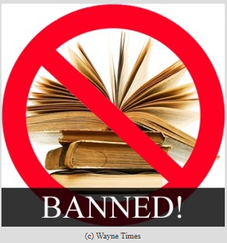 Something disturbing happened to an author friend of mine recently. A writer of horror fiction, he uploaded his latest work to one of the self-publishing platforms. To his amazement, it was rejected because the contents were deemed unsuitable. My friend hasn't been specific about the storyline, only that it contained sexual activity involving a man and a horse.
Something disturbing happened to an author friend of mine recently. A writer of horror fiction, he uploaded his latest work to one of the self-publishing platforms. To his amazement, it was rejected because the contents were deemed unsuitable. My friend hasn't been specific about the storyline, only that it contained sexual activity involving a man and a horse.
Now I appreciate such material may not be to everyone's taste. But to refuse to publish it? Really? Should platforms like Amazon, Google, Kobo, etc., have the right to reject self-published material because they deem it offensive? If so, who sets the criteria? Shouldn't adults be free to decide what they read?
The refusal of my friend's story is rendered more bizarre by the fact there are much more controversial works already on sale from self-published authors. Take 'Sick Bastards: A Novel of Extreme Horror, Sex and Gore' by Matt Shaw. From the title alone, anyone offended by such material should realise this book's not for them. Matt also makes it clear in the caveat he adds:
'WARNING: THIS IS AN EXTREME HORROR NOVEL. There is gore. There is bad language. There are scenes of a sexual nature. But hidden underneath it all is also a chilling story. Please do not purchase this book if you are easily shocked, disgusted or offended. This book is not for you.'
Well, that's clear enough. Anyone who buys the book and then says they're offended doesn't have a basis for complaint, in my view.
Me? I'm with Voltaire on this
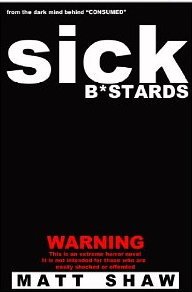 Matt Shaw's 'Sick Bastards' Fiction censorship is nothing new, of course. Throughout history, books have been banned for political, religious and moral reasons, and continue to be blocked today. In a future blog post, I'll be examining censorship of traditionally published fiction, as it's a fascinating topic. Did you know that the children's classic 'Alice's Adventures in Wonderland' was banned in one country in the past?
Matt Shaw's 'Sick Bastards' Fiction censorship is nothing new, of course. Throughout history, books have been banned for political, religious and moral reasons, and continue to be blocked today. In a future blog post, I'll be examining censorship of traditionally published fiction, as it's a fascinating topic. Did you know that the children's classic 'Alice's Adventures in Wonderland' was banned in one country in the past?
I'm against censorship, being a strong supporter of free speech. To paraphrase Voltaire: 'I may not like what you say, but I will defend to the death your right to say it.' When it comes to fiction, my view is this. As long as a suitable disclaimer is placed on potentially upsetting material, then it shouldn't face censorship. And that applies to self-published material as well as books published via the traditional route.
Quite why my friend's story was refused is anyone's guess. It seems one or all of the publishing platforms employ staff to vet submitted material, and perhaps his fell foul of somebody who disapproved of fiction centred around bestiality. Who knows?
Let's hear from you on this subject!
What do you think? Should moral criteria exist for self-published books? Do you believe that fiction dealing with subjects such as bestiality and extreme violence should be banned? Are you an author who has had work refused by a publishing platform? Leave a comment and let me know! If you've enjoyed this blog post, please share! Thank you.
Subscribe to my newsletter and blog!
 I'd love to stay in contact with you! Why not sign up for my newsletter? It's an occasional communication to keep you informed about my new novel releases. I respect your privacy and will never sell your details to any third parties. To sign up, enter your details in the form at the top of the sidebar.
I'd love to stay in contact with you! Why not sign up for my newsletter? It's an occasional communication to keep you informed about my new novel releases. I respect your privacy and will never sell your details to any third parties. To sign up, enter your details in the form at the top of the sidebar.
And if you've enjoyed this blog post, how about subscribing via RSS feed or email? Either click the links in my blog sidebar or sign up via Networked Blogs, also in the sidebar. It'll be great to have you on board!
Shouldn't adults be free to choose their reading material?
 Something disturbing happened to an author friend of mine recently. A writer of horror fiction, he uploaded his latest work to one of the self-publishing platforms. To his amazement, it was rejected because the contents were deemed unsuitable. My friend hasn't been specific about the storyline, only that it contained sexual activity involving a man and a horse.
Something disturbing happened to an author friend of mine recently. A writer of horror fiction, he uploaded his latest work to one of the self-publishing platforms. To his amazement, it was rejected because the contents were deemed unsuitable. My friend hasn't been specific about the storyline, only that it contained sexual activity involving a man and a horse.Now I appreciate such material may not be to everyone's taste. But to refuse to publish it? Really? Should platforms like Amazon, Google, Kobo, etc., have the right to reject self-published material because they deem it offensive? If so, who sets the criteria? Shouldn't adults be free to decide what they read?
The refusal of my friend's story is rendered more bizarre by the fact there are much more controversial works already on sale from self-published authors. Take 'Sick Bastards: A Novel of Extreme Horror, Sex and Gore' by Matt Shaw. From the title alone, anyone offended by such material should realise this book's not for them. Matt also makes it clear in the caveat he adds:
'WARNING: THIS IS AN EXTREME HORROR NOVEL. There is gore. There is bad language. There are scenes of a sexual nature. But hidden underneath it all is also a chilling story. Please do not purchase this book if you are easily shocked, disgusted or offended. This book is not for you.'
Well, that's clear enough. Anyone who buys the book and then says they're offended doesn't have a basis for complaint, in my view.
Me? I'm with Voltaire on this
 Matt Shaw's 'Sick Bastards' Fiction censorship is nothing new, of course. Throughout history, books have been banned for political, religious and moral reasons, and continue to be blocked today. In a future blog post, I'll be examining censorship of traditionally published fiction, as it's a fascinating topic. Did you know that the children's classic 'Alice's Adventures in Wonderland' was banned in one country in the past?
Matt Shaw's 'Sick Bastards' Fiction censorship is nothing new, of course. Throughout history, books have been banned for political, religious and moral reasons, and continue to be blocked today. In a future blog post, I'll be examining censorship of traditionally published fiction, as it's a fascinating topic. Did you know that the children's classic 'Alice's Adventures in Wonderland' was banned in one country in the past?I'm against censorship, being a strong supporter of free speech. To paraphrase Voltaire: 'I may not like what you say, but I will defend to the death your right to say it.' When it comes to fiction, my view is this. As long as a suitable disclaimer is placed on potentially upsetting material, then it shouldn't face censorship. And that applies to self-published material as well as books published via the traditional route.
Quite why my friend's story was refused is anyone's guess. It seems one or all of the publishing platforms employ staff to vet submitted material, and perhaps his fell foul of somebody who disapproved of fiction centred around bestiality. Who knows?
Let's hear from you on this subject!
What do you think? Should moral criteria exist for self-published books? Do you believe that fiction dealing with subjects such as bestiality and extreme violence should be banned? Are you an author who has had work refused by a publishing platform? Leave a comment and let me know! If you've enjoyed this blog post, please share! Thank you.
Subscribe to my newsletter and blog!
 I'd love to stay in contact with you! Why not sign up for my newsletter? It's an occasional communication to keep you informed about my new novel releases. I respect your privacy and will never sell your details to any third parties. To sign up, enter your details in the form at the top of the sidebar.
I'd love to stay in contact with you! Why not sign up for my newsletter? It's an occasional communication to keep you informed about my new novel releases. I respect your privacy and will never sell your details to any third parties. To sign up, enter your details in the form at the top of the sidebar.And if you've enjoyed this blog post, how about subscribing via RSS feed or email? Either click the links in my blog sidebar or sign up via Networked Blogs, also in the sidebar. It'll be great to have you on board!
Published on March 04, 2015 03:43
February 26, 2015
5 Reasons to Quit Reading
By Maggie James
What makes a reader ditch a novel?
 It's rare for me not to read all the way to the end of a novel. I choose my fiction carefully, avoiding genres that I don't enjoy, such as romances. After a lifetime of reading, I know what appeals to me and what doesn't. (Not always, as you'll discover below - sometimes I get it wrong).
It's rare for me not to read all the way to the end of a novel. I choose my fiction carefully, avoiding genres that I don't enjoy, such as romances. After a lifetime of reading, I know what appeals to me and what doesn't. (Not always, as you'll discover below - sometimes I get it wrong).
The other night, though, I gave up on a book after finding some of the content offensive. It got me thinking. What might make a reader ditch a novel? As part of my 'Five' series, I'll be discussing some possible reasons. Let's go!
1. It's badly written
Some novels, whether traditionally or indie published, simply aren't well-written. Poor character development, a failure to round off the narrative properly, plot threads left hanging... the list goes on. Nobody wants to read such books.
Dialogue is a common problem. Some authors struggle with getting it right; their characters' conversations fall flat. Not to mention my favourite bugbear - inappropriate and excessive speech tags. I gave up on one novel partly because the main character rarely said anything. Instead, she chirped and mumbled her sentences, reminding me by turns of a songbird or a sulky teenager. As she was supposed to be a feisty, kick-ass kind of gal, this irritated me. There were other reasons I abandoned the book, but when I read one chirp too many, it was game over.
Speech tags are often unnecessary anyway; if an author has given his/her characters strong enough voices and the dialogue flows well, it should be obvious who's speaking.
Enter the panda with the pistol!
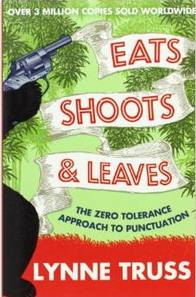 Eats, Shoots and Leaves
2. Bad grammar, spelling and punctuation
Eats, Shoots and Leaves
2. Bad grammar, spelling and punctuation
A criticism often aimed at self-published novels is that they're full of typos and poor grammar. Not always, of course, but there's some truth in the allegation. Whilst I love what self-publishing has done for the industry, I agree that too many novelists present their work with a disregard for the English language. However, it's also a trend I'm noticing with traditionally published books. It's not unusual nowadays to find typos and even plot errors in novels from big-name publishers. I'm told it's because many publishing houses are axing editors and proofreaders in a bid to cut costs. Whether that's true, I can't say, but it's no longer just self-published authors who have to defend themselves from criticism on this score.
Some people, of course, believe it's not important. They say that as long as the plot flows well and the characters engage the reader, then typos and poor grammar don't matter. I say they do. Language is the medium through which writers create their work; shouldn't they be able to employ it correctly? If a musician plays a wrong note, it grates on the ear. The principle's no different with books. Typos jar on the reader, distracting from the narrative - hardly what the author intended. Would you rather be kissed or pissed?
As for punctuation errors, as Lynne Truss so ably demonstrates in Eats, Shoots and Leaves, they can alter the entire meaning of a sentence. Correct punctuation can save lives. Take the following example:
'Let's eat, grandpa.'
Miss out the comma, and cannibalism enters the picture - not a happy scenario for our aged relative:
'Let's eat grandpa.'
Call the cops, someone!
Sex and drugs and rock 'n' roll, plus a dash of aggro...
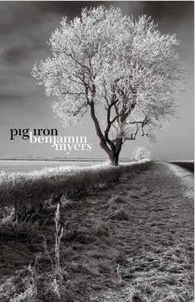 Pig Iron, by Benjamin Myers
3
. The terrible trio - sex, swearing and violence
Pig Iron, by Benjamin Myers
3
. The terrible trio - sex, swearing and violence
I've lumped these together because they all turn off any reader who's sensitive to such issues. Some people don't care for brutality, profanity or sex scenes in novels. As I'll explain later, I ditched one book partly because of its violence. I'm not unduly squeamish, but what I was reading was a step too far for me.
When it comes to swearing, I've been told the use of the F-word in my novels has upset some people, and I understand that. I rarely, if ever, swear. Often, though, profanity is necessary in fiction. It would be inauthentic for me to create a character like Adam Campbell in 'Guilty Innocence', and for him not to curse. He's a murderous psychopath - bad language goes with the territory. In contrast, my fourth novel, 'The Second Captive', contains little profanity. It simply wouldn't be right for the characters.
As for sexual content, I love a good bit of smut! I may well write erotica one day. Some people cringe when fictional characters get down and dirty, however, and that's their preference. Each to their own.
4. The novel doesn't gel with the reader
Sometimes a novel can be well-written, a popular success, and yet something about it doesn't sit well with the reader. I experienced this with 'Pig Iron' by Benjamin Myers. The book has 33 five-star and 11 four-star reviews on Amazon UK, and has clearly been well received. But I simply couldn't get into it, failing to engage with the characters or the storyline. The author's writing style didn't appeal, either. I read some reviews of the book after I abandoned it, and I'm glad I didn't continue. The book contains scenes of sexual torture along with animal abuse - definitely not my thing. By all accounts, the novel is very well written and has garnered critical acclaim, but for me it wasn't a good fit. My fault - I should have read the back blurb more carefully.
Spare the sermon! No preaching, please
 5. When an author pushes his/her own agenda onto characters
5. When an author pushes his/her own agenda onto characters
Sometimes when I read a novel, I sense a personal agenda on the part of the author. This sometimes happens with political or religious issues, and I find it off-putting. As the novelist Ian Rob Wright mentioned in his recent blog post: 'I would never make my own views entirely obvious through my work, because then I am not creating fiction, I am writing propaganda.' I agree.
It's usually easy to spot this one. Typically, a character will espouse a viewpoint that has no bearing on the plot, expanding at length via unnecessary dialogue or narrative. If axing such material wouldn't affect the storyline, then it's likely a spot of personal propaganda on behalf of the author is being deployed.
Like many people, I resent being preached at. It may not mean I ditch the book altogether, but it does colour my view of it. What about you? What would make you ditch a novel?
Apart from the five reasons above, are there any reasons you'd abandon a novel? Does sex, swearing or violence put you off a book? Do typos bother you? Leave me a comment and let me know!
Enjoyed this post? Please share via the links below!
Sign up for my newsletter and blog!
 I'd love to stay in contact with you! Why not sign up for my newsletter? It's an occasional communication to keep you informed about my new novel releases. I respect your privacy and will never sell your details to any third parties. To sign up, enter your details in the form at the top of the sidebar.
I'd love to stay in contact with you! Why not sign up for my newsletter? It's an occasional communication to keep you informed about my new novel releases. I respect your privacy and will never sell your details to any third parties. To sign up, enter your details in the form at the top of the sidebar.
And if you've enjoyed this blog post, how about subscribing via RSS feed or email? Either click the links in my blog sidebar or sign up via Networked Blogs, also in the sidebar. It'll be great to have you on board!
What makes a reader ditch a novel?
 It's rare for me not to read all the way to the end of a novel. I choose my fiction carefully, avoiding genres that I don't enjoy, such as romances. After a lifetime of reading, I know what appeals to me and what doesn't. (Not always, as you'll discover below - sometimes I get it wrong).
It's rare for me not to read all the way to the end of a novel. I choose my fiction carefully, avoiding genres that I don't enjoy, such as romances. After a lifetime of reading, I know what appeals to me and what doesn't. (Not always, as you'll discover below - sometimes I get it wrong).The other night, though, I gave up on a book after finding some of the content offensive. It got me thinking. What might make a reader ditch a novel? As part of my 'Five' series, I'll be discussing some possible reasons. Let's go!
1. It's badly written
Some novels, whether traditionally or indie published, simply aren't well-written. Poor character development, a failure to round off the narrative properly, plot threads left hanging... the list goes on. Nobody wants to read such books.
Dialogue is a common problem. Some authors struggle with getting it right; their characters' conversations fall flat. Not to mention my favourite bugbear - inappropriate and excessive speech tags. I gave up on one novel partly because the main character rarely said anything. Instead, she chirped and mumbled her sentences, reminding me by turns of a songbird or a sulky teenager. As she was supposed to be a feisty, kick-ass kind of gal, this irritated me. There were other reasons I abandoned the book, but when I read one chirp too many, it was game over.
Speech tags are often unnecessary anyway; if an author has given his/her characters strong enough voices and the dialogue flows well, it should be obvious who's speaking.
Enter the panda with the pistol!
 Eats, Shoots and Leaves
2. Bad grammar, spelling and punctuation
Eats, Shoots and Leaves
2. Bad grammar, spelling and punctuation
A criticism often aimed at self-published novels is that they're full of typos and poor grammar. Not always, of course, but there's some truth in the allegation. Whilst I love what self-publishing has done for the industry, I agree that too many novelists present their work with a disregard for the English language. However, it's also a trend I'm noticing with traditionally published books. It's not unusual nowadays to find typos and even plot errors in novels from big-name publishers. I'm told it's because many publishing houses are axing editors and proofreaders in a bid to cut costs. Whether that's true, I can't say, but it's no longer just self-published authors who have to defend themselves from criticism on this score.
Some people, of course, believe it's not important. They say that as long as the plot flows well and the characters engage the reader, then typos and poor grammar don't matter. I say they do. Language is the medium through which writers create their work; shouldn't they be able to employ it correctly? If a musician plays a wrong note, it grates on the ear. The principle's no different with books. Typos jar on the reader, distracting from the narrative - hardly what the author intended. Would you rather be kissed or pissed?
As for punctuation errors, as Lynne Truss so ably demonstrates in Eats, Shoots and Leaves, they can alter the entire meaning of a sentence. Correct punctuation can save lives. Take the following example:
'Let's eat, grandpa.'
Miss out the comma, and cannibalism enters the picture - not a happy scenario for our aged relative:
'Let's eat grandpa.'
Call the cops, someone!
Sex and drugs and rock 'n' roll, plus a dash of aggro...
 Pig Iron, by Benjamin Myers
3
. The terrible trio - sex, swearing and violence
Pig Iron, by Benjamin Myers
3
. The terrible trio - sex, swearing and violenceI've lumped these together because they all turn off any reader who's sensitive to such issues. Some people don't care for brutality, profanity or sex scenes in novels. As I'll explain later, I ditched one book partly because of its violence. I'm not unduly squeamish, but what I was reading was a step too far for me.
When it comes to swearing, I've been told the use of the F-word in my novels has upset some people, and I understand that. I rarely, if ever, swear. Often, though, profanity is necessary in fiction. It would be inauthentic for me to create a character like Adam Campbell in 'Guilty Innocence', and for him not to curse. He's a murderous psychopath - bad language goes with the territory. In contrast, my fourth novel, 'The Second Captive', contains little profanity. It simply wouldn't be right for the characters.
As for sexual content, I love a good bit of smut! I may well write erotica one day. Some people cringe when fictional characters get down and dirty, however, and that's their preference. Each to their own.
4. The novel doesn't gel with the reader
Sometimes a novel can be well-written, a popular success, and yet something about it doesn't sit well with the reader. I experienced this with 'Pig Iron' by Benjamin Myers. The book has 33 five-star and 11 four-star reviews on Amazon UK, and has clearly been well received. But I simply couldn't get into it, failing to engage with the characters or the storyline. The author's writing style didn't appeal, either. I read some reviews of the book after I abandoned it, and I'm glad I didn't continue. The book contains scenes of sexual torture along with animal abuse - definitely not my thing. By all accounts, the novel is very well written and has garnered critical acclaim, but for me it wasn't a good fit. My fault - I should have read the back blurb more carefully.
Spare the sermon! No preaching, please
 5. When an author pushes his/her own agenda onto characters
5. When an author pushes his/her own agenda onto charactersSometimes when I read a novel, I sense a personal agenda on the part of the author. This sometimes happens with political or religious issues, and I find it off-putting. As the novelist Ian Rob Wright mentioned in his recent blog post: 'I would never make my own views entirely obvious through my work, because then I am not creating fiction, I am writing propaganda.' I agree.
It's usually easy to spot this one. Typically, a character will espouse a viewpoint that has no bearing on the plot, expanding at length via unnecessary dialogue or narrative. If axing such material wouldn't affect the storyline, then it's likely a spot of personal propaganda on behalf of the author is being deployed.
Like many people, I resent being preached at. It may not mean I ditch the book altogether, but it does colour my view of it. What about you? What would make you ditch a novel?
Apart from the five reasons above, are there any reasons you'd abandon a novel? Does sex, swearing or violence put you off a book? Do typos bother you? Leave me a comment and let me know!
Enjoyed this post? Please share via the links below!
Sign up for my newsletter and blog!
 I'd love to stay in contact with you! Why not sign up for my newsletter? It's an occasional communication to keep you informed about my new novel releases. I respect your privacy and will never sell your details to any third parties. To sign up, enter your details in the form at the top of the sidebar.
I'd love to stay in contact with you! Why not sign up for my newsletter? It's an occasional communication to keep you informed about my new novel releases. I respect your privacy and will never sell your details to any third parties. To sign up, enter your details in the form at the top of the sidebar.And if you've enjoyed this blog post, how about subscribing via RSS feed or email? Either click the links in my blog sidebar or sign up via Networked Blogs, also in the sidebar. It'll be great to have you on board!
Published on February 26, 2015 04:27
February 19, 2015
Book Review - 'Personal' by Lee Child
By Maggie James
The Jack Reacher series - classy, page-turning thrillers
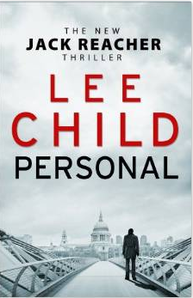 Cover of 'Personal' It's been far too long since I did a book review - time to remedy that! I've been a fan of Lee Child's Jack Reacher titles from the first one I read. Hats off to Mr Child (real name Jim Grant), who has mastered writing bestselling American thrillers, despite being British. He pens classy novels with a twist and a turn in every chapter, books that make me eager to turn to the next page. This week I'll be reviewing his latest Reacher offering, 'Personal', published in 2014.
Cover of 'Personal' It's been far too long since I did a book review - time to remedy that! I've been a fan of Lee Child's Jack Reacher titles from the first one I read. Hats off to Mr Child (real name Jim Grant), who has mastered writing bestselling American thrillers, despite being British. He pens classy novels with a twist and a turn in every chapter, books that make me eager to turn to the next page. This week I'll be reviewing his latest Reacher offering, 'Personal', published in 2014.
First, however, a little about the Reacher series in general. Child has written nineteen novels featuring the former American military policeman, with the twentieth, 'Make Me', due for publication later in 2015. Jack Reacher is an iconic character; tall, tough, an expert fighter, he wanders his home country of America with only a toothbrush and wallet in his pocket. He even spurns carrying a change of clothes, preferring to buy fresh attire as and when he needs it. He has no home, no car, no friends, no significant other, just a desire to live life off the grid and on his own terms. Reacher explores his homeland without so much as a holdall, claiming that if he were to allow possessions into his life, it would open the door to more... and more... and more. Which might lead to acquiring a house for all those possessions, and being settled is exactly what Reacher seeks to avoid.
The girls, the gadgets, the witty one-liners...
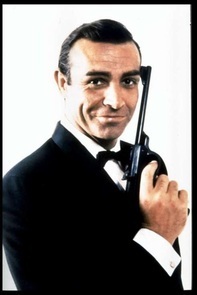 Sean Connery as James Bond
In terms of plot, the Reacher books are virtually identical.
The novels are, as Child has remarked, essentially revenge stories – somebody does something bad, and Reacher exacts retribution.
The plotline and location varies from title to title, but certain elements stay the same. That's not necessarily a bad thing, and I suspect Child employs this strategy for commercial reasons. Why? Because such tactics work. Take the James Bond movies. No matter who the latest Bond actor is, cinema goers know exactly what they'll get for their money. The girls, the gadgets, the witty one-liners... the basic plotline may vary, but the action and adventure remain constant. Guaranteed entertainment. It's no different with Lee Child's novels.
Sean Connery as James Bond
In terms of plot, the Reacher books are virtually identical.
The novels are, as Child has remarked, essentially revenge stories – somebody does something bad, and Reacher exacts retribution.
The plotline and location varies from title to title, but certain elements stay the same. That's not necessarily a bad thing, and I suspect Child employs this strategy for commercial reasons. Why? Because such tactics work. Take the James Bond movies. No matter who the latest Bond actor is, cinema goers know exactly what they'll get for their money. The girls, the gadgets, the witty one-liners... the basic plotline may vary, but the action and adventure remain constant. Guaranteed entertainment. It's no different with Lee Child's novels.
In many ways, I see similarities between James Bond and Jack Reacher. Reacher's as tough as Bond, if not more so. A towering six feet five inches of fighting prowess, he tends to tackle the bad guys in multiples, often taking on five or six men at once and leaving them dead or hospital cases. All the while offloading witty wisecracks - our man's verbally every bit as cool as James Bond. We all love Bond's laconic one-liners, but Reacher can come out with some gems of his own as he bats his ripostes across the conversational table. Take this example of his dry humour:
'I have no desire to go to Buckingham Palace anyway.'
'Wouldn't you like to meet the Queen?'
'Not really. She's just a person. We're all equal. Has she expressed any interest in meeting me?'
No white picket fences for Reacher or his leading ladies
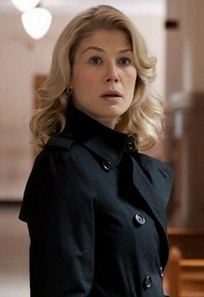 Rosamund Pike as Helen Rodin in the movie 'Reacher' In addition, similar to Bond, Reacher always hooks up with a beautiful, beguiling female; Child's subplots are often concerned with the sexual tension that develops between the two. The epitome of machismo, Reacher is nevertheless portrayed as respectful towards women, despite his 'love 'em and leave 'em' attitude. Not that the latter matters. His cohorts aren't, on the whole, looking for a white picket fence; they're equally happy to enjoy some uncomplicated pleasure. Entertainment, pure and simple, for Jack, his women, and the reader.
Rosamund Pike as Helen Rodin in the movie 'Reacher' In addition, similar to Bond, Reacher always hooks up with a beautiful, beguiling female; Child's subplots are often concerned with the sexual tension that develops between the two. The epitome of machismo, Reacher is nevertheless portrayed as respectful towards women, despite his 'love 'em and leave 'em' attitude. Not that the latter matters. His cohorts aren't, on the whole, looking for a white picket fence; they're equally happy to enjoy some uncomplicated pleasure. Entertainment, pure and simple, for Jack, his women, and the reader.
Let's turn now to gadgets. Our hero has an encyclopedic knowledge of weaponry, although he's a dinosaur when it comes to technology. Despite lacking Bond's fancy gizmos, Reacher employs any guns he comes across to great effect. He knows all about ballistics and firing strategies, facts ground hard into him during his years as a military policeman, and he uses his knowledge well, explaining it to the reader in a way that's never dull. And he's also a mean opponent with his fists and feet. You wouldn't want to piss off this guy, believe me. 'He was useless. A waste of good food. Too stupid to live.'
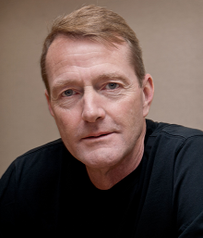 Novelist Lee Child What about his morality? Like Bond, Jack has no compunction about killing another human should the circumstances warrant it. I've read criticism of Lee Child for this, along the lines of how a cold-blooded murderer can't be a hero. I believe that's over-thinking the issue. Child's books are written to entertain, and I doubt anyone would level the same comment at James Bond, simply because he holds a licence to kill and Reacher doesn't. We're not meant to go all moralistic about Child's protagonist. Besides, Reacher has no trouble justifying his actions, either to himself or to others. Take this excerpt from 'Personal', in which he explains his attitude to killing one of the guys sent to apprehend him:
Novelist Lee Child What about his morality? Like Bond, Jack has no compunction about killing another human should the circumstances warrant it. I've read criticism of Lee Child for this, along the lines of how a cold-blooded murderer can't be a hero. I believe that's over-thinking the issue. Child's books are written to entertain, and I doubt anyone would level the same comment at James Bond, simply because he holds a licence to kill and Reacher doesn't. We're not meant to go all moralistic about Child's protagonist. Besides, Reacher has no trouble justifying his actions, either to himself or to others. Take this excerpt from 'Personal', in which he explains his attitude to killing one of the guys sent to apprehend him:
'He had a choice...he could have spent his days helping old ladies across the street. He could have volunteered in the library. I expect they have a library here. He could have raised funds for Africa, or wherever they need funds these days. He could have done a whole lot of good things. But he didn't. He chose not to. He chose to spend his days extorting money and hurting people. Then finally he opened the wrong door, and what came out at him was his problem, not mine. Plus he was useless. A waste of good food. Too stupid to live.'
'The stakes have never been higher...because this time, it's personal.'
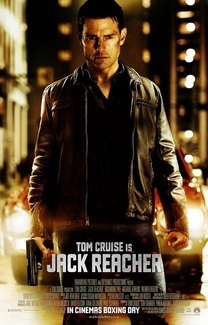 Tom Cruise as Jack Reacher On to the book review itself. Here's what Amazon says:
Tom Cruise as Jack Reacher On to the book review itself. Here's what Amazon says:
'Jack Reacher walks alone. Once a go-to hard man in the US military police, now he’s a drifter of no fixed abode. But the army tracks him down. Because someone has taken a long-range shot at the French president.
Only one man could have done it. And Reacher is the one man who can find him.
This new heartstopping, nailbiting book in Lee Child’s number-one bestselling series takes Reacher across the Atlantic to Paris – and then to London. The stakes have never been higher - because this time, it’s personal.'
Number 19 in the series is one of the most entertaining Reacher novels that I've read. Whether that's because I'm British and the book is largely set in the UK, I'm not sure. It's certainly interesting to experience Lee Child, a fellow Brit, exploring our way of life through the eyes of an American, and not always reverently, which adds to the fun. Reacher doesn't hesitate to crack amusing references to the Queen, the London transport system and our police force, amongst other things, and it's hard not to smile at some of the absurdities he reveals.
The novel moves along at a frantic speed, with hooks at the end of each chapter that drag the reader, metaphorically breathless, towards the next. Lines like: 'I headed towards the sound of her voice, and stepped into a room, and came face to face with myself.' Or: 'He had a gun in his hand, yet another Browning High Power, and he was pointing it straight at my head.' Who could resist turning the page after such a cliffhanger?
A riveting read and a quality thriller
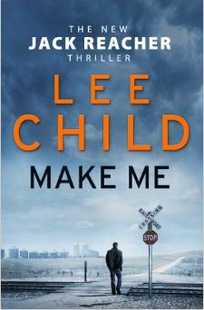 'Make Me', the 20th Reacher novel Unusually for a Reacher novel, the relationship between our protagonist and his female sidekick has a different flavour to the other Lee Child titles I've read. Reacher is more interested in helping rookie CIA agent Casey Nice with her personal issues than rolling her into bed, perhaps because there's a large age gap between them. It's plain he's attracted to her, though. Take this excerpt:
'Make Me', the 20th Reacher novel Unusually for a Reacher novel, the relationship between our protagonist and his female sidekick has a different flavour to the other Lee Child titles I've read. Reacher is more interested in helping rookie CIA agent Casey Nice with her personal issues than rolling her into bed, perhaps because there's a large age gap between them. It's plain he's attracted to her, though. Take this excerpt:
'She knocked on my door, and I opened up and found her in a ponytail and a version of her Arkansas outfit. The same brown leather jacket, over a white T-shirt, with different jeans. Same colour, but lower cut. And all scraped and sanded and beat up. Distressed, I believed they called it, which to me meant upset, which just didn't compute. Was there a finer place to be, than where those jeans were?'
'Personal' is a riveting read in my opinion, a great example of the Jack Reacher series. If Lee Child can maintain thrillers of this quality centred around the Reacher character for nineteen books, then I look forward to 'Make Me' when it arrives. My view isn't shared by many on Amazon, however; the book has attracted a fair number of one-star reviews, many complaining that the plot is tedious and dumbed-down, and that Lee Child has run out of juice with the Reacher character. I disagree, and as long as Reacher's capable of kicking the butts of multiple antagonists in a fight, I'll keep reading his adventures. Here's to number twenty in the series!
'Make Me' will be released in the UK on September 10, 2015. Enough from me - over to you!
What do you think? Have you read 'Personal'? Do you enjoy Lee Child's Reacher novels? Or do you think the character has grown stale with repetition? Do you consider that Tom Cruise, at 5' 7", was miscast as 6' 5" Reacher in the movie? Whatever your thoughts, leave a comment and let me know!
Did you enjoy this post? Please share via the buttons below!
Sign up for my newsletter and blog!
 I'd love to stay in contact with you! Why not sign up for my newsletter? It's an occasional communication to keep you informed about my new novel releases. I respect your privacy and will never sell your details to any third parties. To sign up, enter your details in the form at the top of the sidebar.
I'd love to stay in contact with you! Why not sign up for my newsletter? It's an occasional communication to keep you informed about my new novel releases. I respect your privacy and will never sell your details to any third parties. To sign up, enter your details in the form at the top of the sidebar.
And if you've enjoyed this blog post, how about subscribing via RSS feed or email? Either click the links in my blog sidebar or sign up via Networked Blogs, also in the sidebar. It'll be great to have you on board!
The Jack Reacher series - classy, page-turning thrillers
 Cover of 'Personal' It's been far too long since I did a book review - time to remedy that! I've been a fan of Lee Child's Jack Reacher titles from the first one I read. Hats off to Mr Child (real name Jim Grant), who has mastered writing bestselling American thrillers, despite being British. He pens classy novels with a twist and a turn in every chapter, books that make me eager to turn to the next page. This week I'll be reviewing his latest Reacher offering, 'Personal', published in 2014.
Cover of 'Personal' It's been far too long since I did a book review - time to remedy that! I've been a fan of Lee Child's Jack Reacher titles from the first one I read. Hats off to Mr Child (real name Jim Grant), who has mastered writing bestselling American thrillers, despite being British. He pens classy novels with a twist and a turn in every chapter, books that make me eager to turn to the next page. This week I'll be reviewing his latest Reacher offering, 'Personal', published in 2014.First, however, a little about the Reacher series in general. Child has written nineteen novels featuring the former American military policeman, with the twentieth, 'Make Me', due for publication later in 2015. Jack Reacher is an iconic character; tall, tough, an expert fighter, he wanders his home country of America with only a toothbrush and wallet in his pocket. He even spurns carrying a change of clothes, preferring to buy fresh attire as and when he needs it. He has no home, no car, no friends, no significant other, just a desire to live life off the grid and on his own terms. Reacher explores his homeland without so much as a holdall, claiming that if he were to allow possessions into his life, it would open the door to more... and more... and more. Which might lead to acquiring a house for all those possessions, and being settled is exactly what Reacher seeks to avoid.
The girls, the gadgets, the witty one-liners...
 Sean Connery as James Bond
In terms of plot, the Reacher books are virtually identical.
The novels are, as Child has remarked, essentially revenge stories – somebody does something bad, and Reacher exacts retribution.
The plotline and location varies from title to title, but certain elements stay the same. That's not necessarily a bad thing, and I suspect Child employs this strategy for commercial reasons. Why? Because such tactics work. Take the James Bond movies. No matter who the latest Bond actor is, cinema goers know exactly what they'll get for their money. The girls, the gadgets, the witty one-liners... the basic plotline may vary, but the action and adventure remain constant. Guaranteed entertainment. It's no different with Lee Child's novels.
Sean Connery as James Bond
In terms of plot, the Reacher books are virtually identical.
The novels are, as Child has remarked, essentially revenge stories – somebody does something bad, and Reacher exacts retribution.
The plotline and location varies from title to title, but certain elements stay the same. That's not necessarily a bad thing, and I suspect Child employs this strategy for commercial reasons. Why? Because such tactics work. Take the James Bond movies. No matter who the latest Bond actor is, cinema goers know exactly what they'll get for their money. The girls, the gadgets, the witty one-liners... the basic plotline may vary, but the action and adventure remain constant. Guaranteed entertainment. It's no different with Lee Child's novels.In many ways, I see similarities between James Bond and Jack Reacher. Reacher's as tough as Bond, if not more so. A towering six feet five inches of fighting prowess, he tends to tackle the bad guys in multiples, often taking on five or six men at once and leaving them dead or hospital cases. All the while offloading witty wisecracks - our man's verbally every bit as cool as James Bond. We all love Bond's laconic one-liners, but Reacher can come out with some gems of his own as he bats his ripostes across the conversational table. Take this example of his dry humour:
'I have no desire to go to Buckingham Palace anyway.'
'Wouldn't you like to meet the Queen?'
'Not really. She's just a person. We're all equal. Has she expressed any interest in meeting me?'
No white picket fences for Reacher or his leading ladies
 Rosamund Pike as Helen Rodin in the movie 'Reacher' In addition, similar to Bond, Reacher always hooks up with a beautiful, beguiling female; Child's subplots are often concerned with the sexual tension that develops between the two. The epitome of machismo, Reacher is nevertheless portrayed as respectful towards women, despite his 'love 'em and leave 'em' attitude. Not that the latter matters. His cohorts aren't, on the whole, looking for a white picket fence; they're equally happy to enjoy some uncomplicated pleasure. Entertainment, pure and simple, for Jack, his women, and the reader.
Rosamund Pike as Helen Rodin in the movie 'Reacher' In addition, similar to Bond, Reacher always hooks up with a beautiful, beguiling female; Child's subplots are often concerned with the sexual tension that develops between the two. The epitome of machismo, Reacher is nevertheless portrayed as respectful towards women, despite his 'love 'em and leave 'em' attitude. Not that the latter matters. His cohorts aren't, on the whole, looking for a white picket fence; they're equally happy to enjoy some uncomplicated pleasure. Entertainment, pure and simple, for Jack, his women, and the reader.Let's turn now to gadgets. Our hero has an encyclopedic knowledge of weaponry, although he's a dinosaur when it comes to technology. Despite lacking Bond's fancy gizmos, Reacher employs any guns he comes across to great effect. He knows all about ballistics and firing strategies, facts ground hard into him during his years as a military policeman, and he uses his knowledge well, explaining it to the reader in a way that's never dull. And he's also a mean opponent with his fists and feet. You wouldn't want to piss off this guy, believe me. 'He was useless. A waste of good food. Too stupid to live.'
 Novelist Lee Child What about his morality? Like Bond, Jack has no compunction about killing another human should the circumstances warrant it. I've read criticism of Lee Child for this, along the lines of how a cold-blooded murderer can't be a hero. I believe that's over-thinking the issue. Child's books are written to entertain, and I doubt anyone would level the same comment at James Bond, simply because he holds a licence to kill and Reacher doesn't. We're not meant to go all moralistic about Child's protagonist. Besides, Reacher has no trouble justifying his actions, either to himself or to others. Take this excerpt from 'Personal', in which he explains his attitude to killing one of the guys sent to apprehend him:
Novelist Lee Child What about his morality? Like Bond, Jack has no compunction about killing another human should the circumstances warrant it. I've read criticism of Lee Child for this, along the lines of how a cold-blooded murderer can't be a hero. I believe that's over-thinking the issue. Child's books are written to entertain, and I doubt anyone would level the same comment at James Bond, simply because he holds a licence to kill and Reacher doesn't. We're not meant to go all moralistic about Child's protagonist. Besides, Reacher has no trouble justifying his actions, either to himself or to others. Take this excerpt from 'Personal', in which he explains his attitude to killing one of the guys sent to apprehend him:'He had a choice...he could have spent his days helping old ladies across the street. He could have volunteered in the library. I expect they have a library here. He could have raised funds for Africa, or wherever they need funds these days. He could have done a whole lot of good things. But he didn't. He chose not to. He chose to spend his days extorting money and hurting people. Then finally he opened the wrong door, and what came out at him was his problem, not mine. Plus he was useless. A waste of good food. Too stupid to live.'
'The stakes have never been higher...because this time, it's personal.'
 Tom Cruise as Jack Reacher On to the book review itself. Here's what Amazon says:
Tom Cruise as Jack Reacher On to the book review itself. Here's what Amazon says:'Jack Reacher walks alone. Once a go-to hard man in the US military police, now he’s a drifter of no fixed abode. But the army tracks him down. Because someone has taken a long-range shot at the French president.
Only one man could have done it. And Reacher is the one man who can find him.
This new heartstopping, nailbiting book in Lee Child’s number-one bestselling series takes Reacher across the Atlantic to Paris – and then to London. The stakes have never been higher - because this time, it’s personal.'
Number 19 in the series is one of the most entertaining Reacher novels that I've read. Whether that's because I'm British and the book is largely set in the UK, I'm not sure. It's certainly interesting to experience Lee Child, a fellow Brit, exploring our way of life through the eyes of an American, and not always reverently, which adds to the fun. Reacher doesn't hesitate to crack amusing references to the Queen, the London transport system and our police force, amongst other things, and it's hard not to smile at some of the absurdities he reveals.
The novel moves along at a frantic speed, with hooks at the end of each chapter that drag the reader, metaphorically breathless, towards the next. Lines like: 'I headed towards the sound of her voice, and stepped into a room, and came face to face with myself.' Or: 'He had a gun in his hand, yet another Browning High Power, and he was pointing it straight at my head.' Who could resist turning the page after such a cliffhanger?
A riveting read and a quality thriller
 'Make Me', the 20th Reacher novel Unusually for a Reacher novel, the relationship between our protagonist and his female sidekick has a different flavour to the other Lee Child titles I've read. Reacher is more interested in helping rookie CIA agent Casey Nice with her personal issues than rolling her into bed, perhaps because there's a large age gap between them. It's plain he's attracted to her, though. Take this excerpt:
'Make Me', the 20th Reacher novel Unusually for a Reacher novel, the relationship between our protagonist and his female sidekick has a different flavour to the other Lee Child titles I've read. Reacher is more interested in helping rookie CIA agent Casey Nice with her personal issues than rolling her into bed, perhaps because there's a large age gap between them. It's plain he's attracted to her, though. Take this excerpt:'She knocked on my door, and I opened up and found her in a ponytail and a version of her Arkansas outfit. The same brown leather jacket, over a white T-shirt, with different jeans. Same colour, but lower cut. And all scraped and sanded and beat up. Distressed, I believed they called it, which to me meant upset, which just didn't compute. Was there a finer place to be, than where those jeans were?'
'Personal' is a riveting read in my opinion, a great example of the Jack Reacher series. If Lee Child can maintain thrillers of this quality centred around the Reacher character for nineteen books, then I look forward to 'Make Me' when it arrives. My view isn't shared by many on Amazon, however; the book has attracted a fair number of one-star reviews, many complaining that the plot is tedious and dumbed-down, and that Lee Child has run out of juice with the Reacher character. I disagree, and as long as Reacher's capable of kicking the butts of multiple antagonists in a fight, I'll keep reading his adventures. Here's to number twenty in the series!
'Make Me' will be released in the UK on September 10, 2015. Enough from me - over to you!
What do you think? Have you read 'Personal'? Do you enjoy Lee Child's Reacher novels? Or do you think the character has grown stale with repetition? Do you consider that Tom Cruise, at 5' 7", was miscast as 6' 5" Reacher in the movie? Whatever your thoughts, leave a comment and let me know!
Did you enjoy this post? Please share via the buttons below!
Sign up for my newsletter and blog!
 I'd love to stay in contact with you! Why not sign up for my newsletter? It's an occasional communication to keep you informed about my new novel releases. I respect your privacy and will never sell your details to any third parties. To sign up, enter your details in the form at the top of the sidebar.
I'd love to stay in contact with you! Why not sign up for my newsletter? It's an occasional communication to keep you informed about my new novel releases. I respect your privacy and will never sell your details to any third parties. To sign up, enter your details in the form at the top of the sidebar.And if you've enjoyed this blog post, how about subscribing via RSS feed or email? Either click the links in my blog sidebar or sign up via Networked Blogs, also in the sidebar. It'll be great to have you on board!
Published on February 19, 2015 07:43



